#What does it mean what does it represent?
Explore tagged Tumblr posts
Text
people still don’t understand batman’s rogue gallery and what they represent to him. hollywood i will kill you. listen: each batman villain challenges a different aspect of his character and/or philosophy, and it is why grim dark batman was never meant to work
joker: chaos and order.
the foil to batman’s suppressed madness. bruce is discipline; none is above the code and justice. “you’re just one bad day away from being like me” WRONG!! bruce wayne has not had a good day since he was 10 years old. every good thing that happens to him is followed by 100 bad things. he is the universe’s punching bag. and yet he persists, does he not? does he not still believe in goodness in spite of it all? suck my dick joker he does not think of you AT ALL you are nuisance to him he wants to spend the one day off he has every year with his family and friends and you had to ruin it with ur lame jokes and terrorist attacks
riddler: obsession and intellect.
the foil to batman’s ego. bruce wayne is one of the smartest people in the world, by way of writer favouritism. wdym you outsmarted brainiac, a being of pure intelligence, just because ur the author’s favourite pretty princess? alright king whatever u say. but he never lets it rule him. his intelligence is a tool to of protection; it’s a shield, not a sword. he’d never raise it against the innocent. edward uses his intelligence to prove superiority, that he is better. he is batman without humility, and that is why he will always lose, because intelligence is nothing without wisdom
the penguin: wealth and corruption.
the foil to batman’s class. they’re both billionaires, Gothamite socialites. oswald embraces his privilege and uses it to oppress the poor. bruce wayne understands his privilege and uses it to pull others up. “you wear a mask too” yeah and it’s prettier than urs u ugly bitch. oswald’s socialite mask is a polished classy persona that disguises his inner evil. bruce’s socialite mask is just a himbo and remains true to his desire to help people
mr freeze: love and grief.
foil to batman’s ability to move on from the past. victor fries cannot let go of his wife and makes it everybody else’s problem. this is also the philosophy of grimdark batman, which is why it cannot apply to batman’s true character. bruce wayne is traumatized from his parents’ deaths, but it also inspired him to become the person who he wished had saved him in that alley. how many times has he looked into the eyes of a scared child on patrol and saw himself? he became the saviour for his 10 year old self left in that alleyway. he was able to heal; yes, his parents deaths has shaped him into the man he is, that’s literally what life does. healing doesn’t mean the grief will shrink, but your world grows bigger around it. he has a family again, built by his own hands
scarecrow: fear and power.
the foil to batman’s darkness. batman is iconic for instilling crippling terror into others by a mere look, psychics hate him because his mind is a screaming hellscape, he dresses like a bat because when he was a kid he fell into a hole filled with bats and he associates it with fear. jonathan uses fear to control the helpless, bruce instills fear in evil to protect the righteous. “you’re just as ruled by fear” WRONG!!! batman is ruled by love. it’s not fear that powers him when he drags his mangled, half-dead body off the streets at every dawn to go home for a costume change and immediately go to a charity gala for disadvantaged youths named after his street-rat son. it’s not fear that inspired him to keep lollipops in his utility belt for the children he saves. it’s not fear that makes him do the same old shit of throwing you fuckers into that useless max security prison twice a week after getting his shit rocked, knowing full well he’d have to do it again in a few days, instead of just killing you.
two-face: duality and justice.
the foil to batman’s divided self. harvey started off as a batman, a lawyer wanting to do good. his trauma split him, but bruce integrated it into himself. bruce wayne does not reject his pain, he lets it shape him and he asks himself: “ok that sucked. how do i make sure nobody else will experience that?” harvey dent is completely split, indecisive in his morality, good and evil depends on the flip of a coin. but batman? people say that bruce wayne is the mask and batman is his true self. dawg do u think his kids call him batman? that’s some shit he’d say in his 20s when he was figuring himself out but he’s a middle aged father now and his children would drag him to filth if he says his black-leather bat fursona is his “true self”. they are all him. brucie wayne isn’t completely his mask either, because it’s the persona he uses to fuck with rich people and you know full well he’d delights in that to the bottom of his heart
his rogue gallery is a mirror to each aspect of himself. everything high-brow reddit bros and zack snyder says about batman’s edgy true self is literally disproven by the people batman spends his life trying to save. he’s not on the edge of villaindom; he stares his inner evil that takes on the faces of broken people in the eyes every night and says “this isn’t the way forward”
#does not apply to battinson that is my babygirl#and also he still abides by the philosophy of hope he’s just in his 20s that’s what he’s like#batman#bruce wayne#brucellosis wayne#joker#mr freeze#harvey dent#riddler#edward nygma#jonathan crane#victor fries#everybody else idk#dc#rogue gallery#batfam#gotham rogues#gotham#i wanna fuck him so bad but that’s unrelated#nothing sexier than a genuinely good man who chooses to be good when the cards are stacked against him#brucie wayne#ofc#goth catholic girlies who stan joan d’arc would love him#the tortured redemptionist they’d eat that shit up#burdened by duty driven by love
556 notes
·
View notes
Text
The % of blue eyes on this currently is pretty intriguing (I'm going to Assume it's also absorbing the grey-eyes purely because that's what I thought was closest for mine, though it's still a bit high) but the really wild one was green eyes since I thought that was particularly rare so I poked about.
Numbers seem to vary a LOT but the 30% blue isnt unheard of in some areas in some surveys, so how surprising that is reaaaaally depends on where the userbase of Tumblr is AND which spaces this poll is getting shared around. Brown should be dominating on a globally representative poll but a lot of countries will not be proportionally represented here! (On the site or this poll) And, also, we have to add the first two and an indeterminate slice of the hazel together to get the actual % of voters for brown (since 'hazel' and 'amber' brown are often mixed up - though the hazel % is a lil low still). Even a little of the heterochromia voters may count since there's a lot of different forms, but that's a smaller percent. We've got a range of 40-45% brown, which is way too low for a global spread but isn't far off the US for example (neither is 30% blue, though it's a bit high). But the blue bar being higher IS misleading cos 'almost black' is a kind of brown, the % brown is ~10% higher than blue even if they look about even currently.
Adding in some skew for the lauding of lighter eye colours meaning more of us are probably voting (even marginally, since tumblrs user base feels generally more inclined to correctly celebrate and be proud of brown eyes) and what this poll seems to suggest is that its been shared around in... US and European heavy circles? Given that it's biased by both the site, language, and potentially even cultural sharing habits (as in of reblogs and Tagging what you voted) that does make the results feel a bit less weird. Still interestingly skewed though
the recent eye color post on yesornopolls is intriguing me a lot bc. well. statistically more people should be answering yes to the question here than they are. but obvs the point of yesornopolls is yes or no questions so we can’t exactly do a follow up there. so i’m going into more depth here because i can do what i want
obvs this poll isn’t gonna get as much traction as the poll blog’s will, but it’ll still be interesting to look at the results of it and compare them methinks
(bee tee dubs if your eyes change color based on lighting answer with the color they are most often. pick whatever color you’d put on a legal ID. also the heterochromia button is there with complete heterochromia in mind but if you have central/sectoral heterochromia and feel none of the other options fit you then. go for it i suppose)
9K notes
·
View notes
Text
RECKLESS DRIVING

CHAPTER FOUR
content: language, dijonai is making sure that it's clocking to everyone that she's standing on business, n*tre d*me, mental health issues, mentioned injury, cam roman lore 😍....cam roman lore ☹️💔
wc: 6.7k
notes: sooo this was supposed to include both preseason games but i decided to omit it because there was already a ton of development in this chapter and i feel like writing so many games would get super repetitive. if you're personally saddened by that, then. well. im sorry. but im pretty happy with how this one ends and how it turns out (: as always please let me know what y'all think (and live reacts are so encouraged like im begging on my knees at this point!!! they'll make me write faster, i promise) and i hope you all enjoy 🫶
tags: @cowboybueckers @indigo491 @wnba-scotland @volleyballgirlsblog @sillystarv @middyprincess @intoblonde6ftwbbplayers @user1269 @fivest4rbuecks @everyonewatchesuconnwbb @lilpaigeyherbo @simp4panos

The conclusion of training camp welcomes the beginning of the official preseason. The Wings were taking on the Las Vegas Aces at Purcell Pavillion in Notre Dame, home of the Leprechauns and the Fighting Irish. While Cam does have to concede to the fact that her alumnus mascot was (unofficially) a tree, there’s just something about representing a leprechaun that she just can’t get behind.
Either way, their first preseason match was intended to be a welcome home thing for Arike, Jewell, and Jackie, so the last thing Cam was going to do was bitch about a preseason venue.
Their second preseason game was against the Toyota Antelopes at home, a professional basketball team based in Japan. Considering that Mai Yamamoto, one of the Wings guards, plays for the Antelopes in Japan, it was also supposed to be a reunion game of sorts for her and her teammates.
As far as preseason matches went, Cam stopped feeling nervous about them after her first year. They served as the final chance to prove that you deserved a spot on the team if training camp didn’t solidify it. They were more important for rookies and newcomers on the team – and, sure, while they were the first “real” games of the season and gave them a chance to put their chemistry and skills to the test against people who were out for a win and not just to do their job as practice players, Cam knew that preseason standings didn’t really mean anything.
The important part of preseason games wasn’t necessarily the box score, nor was it the number that reflected in the win column. The important part was determining how well players worked with one another, if they showed considerable hustle, if they demonstrated just how badly they wanted to stay on the team in the limited amount of time they were afforded on the court.
Nobody was playing anymore than thirty minutes; in fact, twenty five was pushing it. Compared to the Aces, the Wings had a lot more roster decisions to make and not nearly enough time to make them. Cam knew that their rotations and lineups would be a crime against basketball, which probably also meant there wouldn’t be a number in the win column as much as there would be one in the loss column. The Aces had made it far into the playoffs last season and were the champions the season prior. They retained a lot of that championship core and had a coach that was considerably more qualified.
That was always the really depressing part about the preseason. Not the unquestionable loss because your first match was against a team that had proven themselves time and time again. It was the fact that there was a chance – no matter how hard you worked – to get waived purely because you didn’t have the time to grow into your role and prove that you could make a difference. That was the depressing thing about the league as a whole, actually. Unless a team was truly committed to a long term rebuild, you had to come in perfect. Ready to play. Ready to grind and hustle. Talent or skill or ambition isn’t always what defines someone’s career in the W. It’s time.
Training camp had been informative. All things considered, the Wings had a really good rookie class. Paige was obviously Paige – she already had undeniable chemistry with a lot of people on the court. She behaves like she’s DiJonai’s annoying little sister, or at the very least, like she’s DiJonai and NaLyssa’s bad ass child who’s constantly testing how much she can get away with. She’s got an easy relationship with Maddy, which surprises Cam a little seeing how much Paige hates Villanova. She connects instantly with the rookies, especially Aziaha and JJ, who showed out the entire week and were itching to claim a roster spot.
It wasn’t just the rookies who came in with something to prove. NaLyssa and DiJonai showed out, impacting majorly on both ends of the court. Ty was lethal, bringing in a sort of veteran guard play that Cam was excited to run with this season. Myisha also brought in some invaluable vet experience, even though everyone all around was confused when Chris started going on about how he wanted Myisha to be more active in bringing the ball up.
Cam wasn’t sure how to voice that opinion – about having their team play out of position like that. She gets what Chris is trying to say about a player-run team, she really does, but there’s roles to play on the court for a reason. When Myisha’s main role is to play at the four or the five, she shouldn’t be expected – let alone coached – to initiate the offense like she’s the starting point guard.
For all of Cam’s experience and time in the league, she just didn’t know how to bring that up to Chris without sounding like she’s discrediting him as a coach, because that would quickly be a surefire way to make things awkward in the locker room. And for as much as he preaches about it being a player-run team, it’s only player-run in the sense that he wants his bigs to shoot threes like they’re prime Curry and to make decisions about offensive sets that he should be making decisions about.
So Cam did what any self-respecting veteran on a team with a questionable coach would do. She put aside her and Nola’s (nonexistent) Unrivaled beef and explained that she just wasn’t confident in how this was being handled. Between Chris’s mandatory morning meditation, his youth pastor sermons, and the fact that he (on multiple occasions) called for his starting point guard (read: number one draft pick, Nancy Lieberman award winning, NPOY as a freshman, national championship winning starting point guard Paige Bueckers) to play off-ball because he’s running a play to get Myisha an open three like she’s Kamilla Cardoso in the final seconds of the SEC semifinals against Tennessee, Cam just thought that maybe someone should step in and let Chris know that his players aren’t really sold on whatever the fuck this is.
And, well, Nola tried. They’d had a lengthy conversation for a while during warm ups that Cam sensed he wasn’t really listening to. Seriously – she was watching them from the corner of her eyes, Nola’s arms gesturing from the passion of her argument, and Chris just stared unblinkingly with his arms crossed. He didn’t say much. Clearly, he didn’t have to.
It wasn’t the whole running-plays-to-get-Myisha-open thing. If she can knock them down, she can, and that’s good for them. It was more about the fact that Chris didn’t seem to prioritize the rest of the offense.
But that was just the first few days of training camp. They still had practices, the entire preseason to get through, and they’re all adjusting. That’s what Cam is trying to remind herself, at least. Chris doesn’t have a lot of experience at the head coach position (which is another issue in and of itself), so maybe he’s just trying to find his footing, too.
A slightly more blunt, if not meaner part of Cam reasons that many players – many of her teammates – won’t be afforded the chance to find their footing or figure out how this works. The front office and coaching staff wouldn’t hesitate to cut a player who wasn’t a good scheme fit or wasn’t producing the numbers they needed. And if Chris doesn’t produce the numbers he needs to because he’s trying to brute force something that just isn’t working out, then…
Cam doesn’t think she has to finish that thought.
Their game against the Aces is tomorrow, and they’re flying out to Indiana in the early afternoon. The flight was only two and a half hours at most, but the staff wanted to get in to have enough time to relax before a quick evening practice. Cam’s dressed for comfort – an all grey Nike sweatsuit from a sponsorship package and a pair of slippers. The rest of the team is dressed similarly in hoodies and sweatpants. Cam slides into her usual seat towards the back, hoping for a little bit of peace and quiet so she can finish the book she’d started at the beginning of the month and swore that she’d actually read.
She supposes the whole peace and quiet thing should have been a little too much to ask for. DiJonai settles into the aisle seat next to her, hair in a loose bun and swamped in a hoodie, and the expression on her face is far too nonchalant to be anything but mischievous.
Paige, who’s standing in the aisle, glances once at the both of them, face shifting like she’d wanted to sit next to Cam and pester her, before she settles into an empty seat a few rows in front of them. And when NaLyssa smiles as she takes the aisle seat next to Paige, Cam knows that this was a set up from the beginning.
Cam crosses a leg over her knee, pushing her headphones over her ears and cracking open her book, hoping that DiJonai would get the message and leave her alone if she looked really committed to minding her business. The peace only lasts until takeoff, a few pages, and a few songs in Cam’s playlist before DiJonai tucks her bookmark into the spine and closes the book for Cam.
Cam sighs. She shifts, pulling one headphone ear off, and stares at DiJonai, who’s grinning. Begrudgingly, she asks, “What do you want?” and DiJonai all but lights up.
“I just wanted to know how draft night was,” Nai says innocently, long lashes fluttering. “You never told us, which is weird because you didn’t shut up about going for a week.”
Cam hopes her face isn’t as red as it feels. “It was draft night,” she says plainly. Unconvincingly. “I did media. Listened to analysts talk about defense and championships. Said hi to Kiki Iriafen.”
DiJonai hums as if she’s fully invested in the story. “And what did you do after the draft?” she asks, not even bothering with trying to be subtle.
“Nai,” Cam huffs, rolling her eyes.
DiJonai raises her hands in surrender. “Hey. Just trying to get the story from you and not the people on Instagram who tagged you in a couple videos at Paige’s afterparty. Better that than making assumptions about the insane sexual tension at training camp, right?”
“There was no sexual tension at training camp,” Cam retorts, but her words fall a little flat and DiJonai’s brows raise slightly. Cam purses her lips, knowing that she’s not making it out of this, and she lowers her voice so only DiJonai can hear her. “Yes, Paige invited me to her afterparty.”
“And?” DiJonai prompts.
“You’re such a freak,” Cam mutters, cheeks burning. She decides to just rip the band aid off. “I went. We drank. A lot. Partied. Then I went back to her hotel room and woke up naked in bed next to her at 5am.” DiJonai nods solemnly and Cam adds, “Which I’m sure you knew since you’re a walking lie detector and you’re always in my business.”
DiJonai can’t help but laugh. “I think you sleeping with my teammate is my business,” she retorts. “Especially my number one draft pick, rookie teammate.”
“You’re sleeping with your teammate, Nai,” Cam states.
“Semantics,” Nai murmurs, and despite herself, Cam can’t help but smile. “So what are you doing about it?”
Cam doesn’t answer for a while, millions of thoughts swimming through her mind at once. She didn’t want a lot of people to know about this. Not yet, at least. It was just supposed to be theirs. Their story, their decision, their cross to bear.
But she knows she can trust DiJonai, who was one of the first friends she’d made when she arrived at Stanford for summer conditioning. She sighs when she spots the blonde hair peeking back at her from a couple of rows up, undoubtedly locked in the same conversation with NaLyssa.
“We’re keeping it clean,” she responds after a beat. Then, she thinks back to how she’d kissed Paige’s knee after wrapping it, how she rode home with the blonde instead of Maddy after team dinner. Then, quieter, she corrects, “Trying to. I’m her vet. She’s my rookie. This year’s gonna be hard for her. I know that better than anyone else. I don’t want our personal… entanglements to make things any more complicated for her.”
DiJonai snorts. “Okay, Jada Smith,” she says, which makes Cam laugh a little. “I want you to try again and tell me the truth this time.”
Cam furrows her brows, finally turning her head to meet DiJonai’s gaze. Her brown eyes are soft, no trace of anything teasing, and Cam swallows thickly, half confused and half caught. “That was the truth, Nai,” she says honestly, her voice faltering a little.
“Can I be brutally honest?”
Cam’s frowning when she says, “You were going to be, anyway.”
DiJonai nods, conceding, because yeah. She was. “Are you making such a big deal of Paige being your rookie because you genuinely want to help her grow and develop in the league or are you so committed to this because you’re trying to heal a part of you that was struggling and didn’t have a vet to be there?” DiJonai asks.
Cam opens her mouth to respond, but she clamps it shut quickly, processing. DiJonai doesn’t wait. Her next words land just as sharply as the first ones. “Intentions are felt differently than actions are. Like, my intent right now is to make you get your head out of your ass, but my actions are probably hurting your feelings a little, right?”
Now that is something she can answer. Cam laughs a little. “A little,” she admits. “In a good way, though.”
“Paige is not going to experience her rookie year the same way you did, Camille,” DiJonai continues, her tone softening. “She has a great head on her shoulders. A support system, a team full of vets that can and would punch back for her. She has you, so be there for her, but don’t get caught up in trying to save her because there wasn’t anyone there to save you. That would ruin the locker room faster than you sleeping together would.”
Cam doesn’t say anything. DiJonai has always been right about a lot of things and Cam knows this is one, even if she never fully realized where her own actions were coming from. Before she can respond, DiJonai is speaking up again. “Do you like Paige?”
“That sounds so juvenile.” Cam attempts a laugh, but the both of them can hear the deflection in it. DiJonai doesn’t even have to look at her sideways before Cam sighs again. “I don’t know what this is, Nai,” she answers. “Paige is just… she makes everything so easy. She’s funny, disgustingly kind, and unbelievably thoughtful for someone who talks so much shit on the court.”
DiJonai nudges her with her elbow. “That sounds like a yes to me, babe,” she whispers.
And that makes Cam exhale sharply, because yeah, it really, really does sound like a yes. It sounds like Cam knowing she was doomed the moment Paige walked backstage with a Wings hat and a glimmering chain dangling over her collarbones. It sounds like Cam knowing that falling into bed with Paige would change the course of their friendship forever and doing it anyway.
“That’s the scary part,” Cam confesses in a soft murmur. “Because we can’t let it happen.”
“Says who?”
“Says me.” Cam swallows, her fingers picking at a loose thread on her sweatpants. “We’re reckless. I slept with her the very night we drafted her. I wanted it. I wasn’t thinking about why I shouldn’t. I meant to have sex with her but I didn’t think it’d go this far.”
“The feelings?” DiJonai supplies, trying to fill in the blanks as her brows furrow.
Cam nods silently, not wanting to say it out loud. “If we go further…if we let this get out of hand, everything will change,” she whispers. “It won’t just be about basketball. It’ll be about her, whatever us means, and the fact that someone will eventually get hurt.”
DiJonai stares at her for a long moment. Cam just sighs, knowing DiJonai is about to tell her something about herself that she hadn’t realized yet. “It sounds like you’re trying to convince yourself that you can’t have her,” she says. “You’re trying to end it before either of you has a chance to say otherwise.”
“I’m protecting us. I’m protecting her.”
“From who?” DiJonai asks gently. She’s using that tone of voice where she knows the answer already. She’s just trying to make Cam hear it, too. “From yourself? From things you’re scared of that might never hurt her?”
Cam doesn’t respond. Her throat burns with something like guilt and her chest tightens with something that feels like need. No matter how much she wants it – or how much Paige might want her in a way that’s beyond physical, she just can’t. She has to be the careful one, even if she’s the one who keeps pushing their boundaries and falling right back into her.
They haven’t been doing this for a long time. Seeing one another, being teammates, sharing late night rides home like they know which jokes are funnier when combined with midnight delirium. And that’s horrifying because Paige makes it so easy to feel like they’ve been in each other’s lives for longer than a few weeks. It’s all so sudden, so quick, and the worst part isn’t because Cam is scared. It’s because Cam wants more despite it all.
During camp, Cam had told Paige that getting used to the noise meant learning how to give less of yourself to others. She’d meant the media and the journalists. But now, as she listens to NaLyssa’s stifled laughter and Paige’s choked giggles from a few seats away, Cam is suddenly struck with the realization that she might just be asking Paige for too much.
DiJonai was right. She was trying to be Paige’s vet for all of the wrong reasons. They were well-intentioned reasons, sure, but Paige can’t heal old wounds she’s not responsible for. She can’t heal old wounds she doesn’t even know about just because Cam sees too much of herself in her – a critically acclaimed number one draft pick, a franchise piece, someone molded by the sharp press of expectant hands.
Then, in a softer tone, DiJonai is speaking again. “You need to let her want you. You need to let her choose you,” she murmurs. “‘Protecting’ her is just gonna hurt you both in the long run. Don’t be scared to want her.” DiJonai pauses, letting her words settle in the space between them. “There’s never gonna be a right moment, Cam. And if you keep waiting around, you’re gonna miss out on her completely.”
Cam swallows, her throat bobbing. “I know,” she says.
DiJonai looks at her once more before placing her hand over the back of Cam’s head. She tugs gently, pressing her cheek to her temple, and Cam sinks into her touch gratefully. Neither of them have to say anything. Then, DiJonai stands and leaves, and Cam sighs, trying to regulate her thoughts before she reaches for her book again.
The peace, as it always does, doesn’t last too long. When she glances up, Paige is standing in front of her with a sheepish expression on her face, her bag slung over her shoulder and her iPad clutched in her other hand. “Nai kicked me out of my seat,” she supplies quietly. “Said she needed ‘Lyss time’ and that you needed a babysitter.”
Cam huffs, though it sounds more like a breathless laugh, and she shuts her book again as she gestures to the seat. Paige, however, skips the aisle completely and settles on the middle seat, placing her bag in the open spot. Cam doesn’t comment on it, trying to hide her smile, already feeling a little better, as Paige gets comfortable.
“You play today’s Wordle?” Paige asks.
Cam glances over at her, watching her open up her iPad, and she smirks softly. “Didn’t take you for someone who did,” she admits. “Do you play the crossword, too?”
“Do I play the crossword?” Paige repeats, her tone in disbelief. She switches tabs to reveal her results on the mini crossword, where she’d solved it in 47 seconds. Her smile is far too smug. “Big East Scholar Athlete of the Year, remember? And I don’t even need no fancy Stanford degree.”
“Your ego is big enough to have three Stanford degrees,” Cam mutters, but she can’t keep the grin off her face as she watches Paige navigate back to the Wordle tab. “You should try ‘adieu.’”
Paige scoffs, but inputs it anyway. AD are green, and the E is in the wrong spot. Cam smirks to herself triumphantly. “You’re such a tryhard,” she says. “What’s next? Stare, cloud, pinky?”
Cam wrinkles her nose. “Trust me. I’m not that annoying.”
Paige side-eyes her, like she doesn’t believe it. They finish out the rest of the Wordle together, laughing at each other’s guesses, until they end up on the answer adept. It makes Cam feel a little bit better about their situation.
She has to convince Paige to turn on a movie and not film – who willingly watches film before a preseason game? – but eventually, they both agree on a movie that only Paige is watching as she whispers jokes about the actors that Cam can’t help but smile at.
But her head starts feeling a little heavy, falling onto Paige’s shoulder, although neither of them seem to mind. Paige shifts a little if only to make it a little more comfortable.
Cam’s not usually one for napping on the plane. There’s just something about being so far up in the sky that makes her unable to relax – but now? That’s the last thing on her mind.
Paige isn’t joking about the actors’ cringy lines or how bad the storyline is. She’s dragging her fingers soothingly along the inside of Cam’s wrist, right where a phantom ache had been taking root, lulling her into slumber. The last thing Cam truly registers before she fully drifts off is the warmth of Paige’s body against hers.

The Wings touch down in Indiana in the late afternoon. Paige doesn’t say anything about Cam sleeping on her shoulder, so Cam doesn’t either, and the bus ride to the hotel is peaceful. The remnants of Cam’s nap lingers in her bones like a weighted blanket that she can’t quite shake off. She knows better than to sleep when she makes it back to her room. While she knows a lot of players who need a pregame nap to feel energized, it always makes Cam more sluggish for the game. She’ll probably have to hit the gym before everyone else does to wake up a little more.
After unpacking and changing out of her dirty airport clothes, DiJonai drags Cam out of her room for a light dinner with the team prior to their evening practice. Knowing that she has truly no reason to refuse, she joins DiJonai in the lobby to walk to the restaurant. She’s waiting with NaLyssa and Paige – which is starting to become a pattern, but Cam is just appreciative of the fact that everyone is getting along.
Dinner is quick, but lively. The place they’d chosen wasn’t anything too fancy, but it wasn’t fast food, either, and Cam is grateful that it wasn’t in the midst of the dinner rush. She’d feel awful for the waitstaff for having to deal with a party of seventeen hungry athletes along with their other patrons. Cam is squished in between Paige and Arike at the far end of the table with NaLyssa, DiJonai, and Maddy sitting across from them, which means that their section of the table is probably the loudest.
It’s not annoying or belligerent. It’s probably the most simple feeling of family that Cam’s ever felt in her life, with NaLyssa and DiJonai bickering about what to order and Paige and Arike locked in a heated debate with Maddy about whether or not ankle socks are a crime against basketball and dragging Cam into their argument to settle it.
(Spoiler alert: the argument doesn’t get settled, only because Cam jokes that she’d prefer to hoop barefoot (which, mind you, is not true at all) and everyone took her seriously, leading into an entire sub-argument.)
They go their separate ways after dinner, parting long enough to relax and then grouping up once more with their duffle bags and taking the bus to Purcell. The energy in the locker room is electric. Everyone is excited to play tomorrow – even if some girls were worried about keeping their roster spots.
Chris leads them through a quick meditation routine to clear their minds and get them mentally prepared for practice. Cam still thinks it’s stupid, but if Chris thinks they’re effective, then he won’t stop. Warm ups are thorough, and before she knows it, the team is working through a couple of new plays and a few priority defensive sets.
Everyone is laser-focused, burning through their drills and scrimmages with intensity, and they’re all dripping with sweat when Chris finally ends practice at about 8pm. He thanks them for their time and hustle and reminds them all to meet in the lobby at 9am for team breakfast and a quick film review.
Cam exhales in relief when their huddle breaks, looking forward to a hot shower and relaxing in bed. She walks with the rest of the team to the locker room, claiming an empty shower to rinse the sweat off and redress in comfortable clothes – she’d shower again back at the hotel. By the time she’s out, there’s only a few stragglers left in the locker room, none of which are the blonde rookie she’d been unconsciously looking for.
Cam figures she’d headed straight back to the bus, so she makes her way down the empty halls with her bag slung over her shoulder. However, the sound of a ball bouncing against polished wood makes her ears perk up, and pauses in front of the tunnel doors, peering through the glass windows. She spots someone standing at the free throw line in front of a hoop and doesn’t even have to wonder who it is.
She pushes the door open and makes her way onto the court, where Paige comes fully into view. The sweat still clings to her practice jersey and her bun looks like it’s seen better days. Still, there’s a spark of determination on her face, and she sinks her next free throw with ease.
Cam steps a little closer, a gentle smile on her face. “You’re making the rest of us look bad, you know,” she calls out, which makes Paige huff out a quiet laugh as she chases after her rebound. “Practice ended, like…” Cam lifts her wrist, glancing down at her watch, “...twenty minutes ago. You tryin’ to miss the bus?”
The ball swishes through the net once more, and this time, it’s Cam who hunts for the rebound. She doesn’t pass it back until Paige responds to her. “Just wanted to get a few more shots in,” she says, and Cam wonders where she’d heard those words before.
She checks the ball back to her with a raised brow, moving to stand under the net. “Nervous?” she asks, no trace of a tease in her tone.
Paige shoots again. Cam rebounds for her. “A little,” Paige confesses. Something in Cam softens. She has half a mind to interrupt, to tell her that she has no reason to be nervous, but she thinks back to the conversation she’d had with DiJonai on the plane. Paige isn’t the same rookie she once was, so she shuts up and lets Paige finish. The ball sinks through the net while she gathers her thoughts.
“I guess it’s more like…anticipation,” she clarifies. “It’s a bigger stage. It means something. It’s a blessing to play and I’m grateful that I get to, but I just…I wanna do well. I don’t wanna mess this up.” Paige stops speaking, but her hands don’t slow. She shoots again, a thoughtful expression on her face.
Cam doesn’t immediately pass the ball back. She shifts its weight between her palms, taking in the quiet softness in Paige’s features. There’s sweat beading at her hairline, a slight exhaustion in her eyes that you wouldn’t normally catch unless you knew what bone-deep tiredness felt like.
She’s been moving non-stop for nearly a month – the Final Four, the National Championship, the countless public appearances and the victory tour, then draft night, then even more appearances, then the entire move and training camp. Cam isn’t sure when is the last time that Paige slept for more than six hours. She gets the impression that she won’t sleep until someone or something forces her to.
“Everyone always tells you that you won’t mess it up,” Cam says plainly, trying to be intentional with her words, DiJonai’s advice still fresh on her mind. Paige’s eyes shine under the fluorescent lights, head tilting slightly. “Which, by the way, is the worst advice ever given, only second to being told to invest in Crypto.” The blonde’s lips quirk into an amused smirk. “Point is…you’re gonna mess up, Paige. You’re gonna make a bad pass and turn the ball over and you’re gonna make a really stupid play on defense and foul someone while they’re shooting a three. And that’s okay.”
Cam passes the ball back to her, and Paige doesn’t respond for a beat. Wordlessly, she shoots again. It swishes in cleanly. “Screwing up is part of the process,” Cam continues. “Means you’re trying, right? And, yeah, it’s hard to not expect perfection from yourself. You’ll kill yourself thinking about what you could have done differently. But the people who love you aren’t gonna think any less of you for being human.” Cam catches the next rebound, and her voice is softer when she says, “Especially not me.”
Paige catches the ball easily, a smile curving on her lips. She doesn’t shoot it again. Instead, she places the ball on the rack, and her next question takes Cam by surprise. “What was your rookie year like?” Cam raises a brow at her, shocked that she actually wants to hear about it, and Paige seems to take her silence as rejection as she hurries to explain. “You talk about like…I don’t know. It’s like there’s pain there.”
Cam sighs, bouncing on her heels again, trying to find the right words to say. But Paige is looking at her with an expression of unadulterated softness, a gentleness that encourages her to find her voice. Paige is the last person in the world who would judge her.
Before she can open her mouth to say anything, her phone buzzes in her pocket, and she glances down at her watch, sheepishly reading the text message from DiJonai. “The bus is about to leave us if we don’t go,” she informs Paige, who nods with slight guilt on her face. She pushes the ball rack to the front of the scorer’s table, grabs her bag, and after clicking off the lights, Cam shuts the door behind them.
They walk through the empty hallways in relative silence. Paige doesn’t push her to speak, and Cam is grateful for that silent support. Eventually, she frowns, asking, “Do you ever feel like no matter what you do, it’s not enough?”
Cam knows that’s a stupid thing to ask Paige. She’d been part of injury-ridden rosters where she had to play center as if she wasn’t five inches shorter than the other players in her role. There were games in her college career where she scored or assisted on nearly all of her team’s points. Where she’d played the full forty minutes despite injuries of her own – and for all of the fight in her body, for every second she played and for every point she scored, it wasn’t enough to take the win.
Paige’s voice is hardly a whisper when she confesses, “Yeah. All the time.”
Cam swallows, vulnerability making her eyes sting. “That’s what my rookie year was like. We were such a young team. Younger than we are now, I think. We had four vets and the rest of us were either rookies, first, or second years. I was drafted first overall to a team that had Marina, Arike, Satou, and Moriah, expected to be the franchise piece, but I just wasn’t. I was good. Just not explosive like I’d been in college.”
“Why?” Paige asks, her tone not unkind. “Did you…struggle to adjust?”
Cam laughs a little, throwing open the door to the parking lot, where the bus idles, waiting for them. “Yeah. That and a trapezium fracture in the national championship that I played through, didn’t heal properly, and probably fucked up for good by going straight into my rookie season.” She waves her right hand for emphasis.
They both fall silent as they step up onto the bus together, much to the wolf whistles and teasing from many of their friends, but the energy quiets down when they catch the somber looks on Paige and Cam’s faces.
DiJonai looks a little apologetic, but Paige just leads Cam towards the back of the bus, where she takes her duffle bag wordlessly and gestures to the window seat. Cam doesn’t complain – she takes the seat, and Paige deposits her bag on the floor of the bus while balancing Cam’s bag on her knees.
“They let you play like that?” Paige questions in a quiet whisper when the bus starts rolling.
Cam shrugs. “I got wrist surgery the day after the game. I was looking at a four to six week recovery period, but I did it in three so I could be cleared for training camp. The trainer told me to take it easy for camp and preseason, so I did, but I tweaked my wrist again in the first preseason game against the Sun. DeWanna Bonner is a very deceptive hundred and fifty pounds. She almost sent my ass to an early retirement.”
The joke doesn’t make Paige laugh. Or even crack a smile. She actually scoffs a little. “And you were the one tellin’ me to listen to my body and to tell the staff when I needed a break.”
That makes Cam smirk. “Where’d you think I got that advice from, Paige? A fortune cookie? I told you. I lived it.”
Paige laughs a little at that. Then, softly, she says, “You’re strong for that.” Cam glances over at her, the tension in her jaw easing, something gentle in her eyes. “Playin’ through it in the natty. Playin’ through it in your rookie season. And still getting Rookie of the Year. You’re kind of a badass.”
Cam snorts, feeling strangely touched. “Yeah, well, I didn’t feel much like one,” she admits. “My numbers dropped. I had too much of an ego to sit out and actually heal my wrist. I didn’t really have anyone to lean on and I didn’t tell anyone about how badly it hurt – much less the media, so I sat through an entire season of ‘Camille Roman’s a bust’ and ‘Dallas should have drafted Charli Collier.’”
“You averaged 22 points a game your senior year at Stanford,” Paige says. Cam glances over, watching her scroll through her season averages on her phone. “8 boards. 5 assists. 3 steals.”
“Thanks, Ryan Rucco.”
“Rookie season,” Paige continues, ignoring her, fingers flying across her screen. “16 points. 5 boards. 3 assists. 2 steals.”
“Yeah,” Cam agrees. “According to ESPN analysts, that’s a pretty steep drop off.”
“You were injured.”
Cam shrugs again. “Didn’t matter. Point is I was doing everything I possibly could have. I was playing through an injury. I was getting extra shots after practices.” Her voice drops to a whisper when she admits, “I ate less. Slept less. I didn’t really have an appetite anymore and I just couldn’t close my eyes at night without thinking of what I could have been doing instead to make my game better.”
She swallows thickly, saying, “Eventually, I went down at a practice shortly before the All-Star break – I’m sure you can guess why. I had to miss the last three games to get my body right and the trainers told me I probably wouldn’t be able to play basketball again if I didn’t take the All-Star break off to rehab my wrist. So…I missed out on my first All-Star appearance and went to rehab. I came back and got my numbers up. I was averaging 11 points before the break. Kind of crazy what good rehab does, right? We made it to the playoffs that season and lost in the first round anyways. Then I took that entire offseason to get my shit together. My wrist and my mental’s better now, but… I don’t know. There’s a part of me that mourns what my rookie season could have been.”
“There’s nothing wrong with that,” Paige says softly. That draws Cam’s attention, because Paige might just be the first person to ever say that to her. Over the course of the past few years, she’s gotten constant affirmations of Well, you got Rookie of the Year anyways! (but at what cost?) or reminders that You should be appreciative that you got to play regardless. Cam hasn’t forgotten either of those.
While she gathers her thoughts, Paige’s left hand absentmindedly finds her right, her fingers pressing soothingly to the side of her wrist, where there’s a lingering soreness from the old injury. It doesn’t hurt like it used to, only flaring up after strenuous practices, but Paige finds the tender parts like it’s second nature. Cam tries to pretend like the gesture doesn’t make heat rise to her cheeks and water sting her eyes.
“You can appreciate what you were able to experience and still wish it was different,” she continues, the look in her eyes faraway like she’s remembering something, too. “I like to think that God has a plan for me, you know. That there’s a reason I got injured and had to miss out on so much. I’m grateful for the lessons but sometimes I wish I just had a few more healthy seasons.”
“Nothing wrong with that,” Cam echos, and the both of them share a matching smile. She sighs, adjusting in her seat, splaying her palm out so Paige has more room to work with. “That’s why I’m the way I am with the rookies,” she confesses, feeling something in her chest loosen at being able to verbalize it after her conversation with DiJonai. “I’d never wish my rookie year on anyone else. And if there’s anything I can say or do to make sure another rookie doesn’t go down that path, then I’d consider that a blessing.”
When Cam looks over, the curve of Paige’s soft smile is illuminated by the street lamps peeking through the bus window. Her cheeks have popped out the slightest bit, something that Cam has noticed she does when she’s truly happy, and it makes her smile, too. “For what it’s worth,” she whispers, “I really appreciate it. You make it feel less lonely and less overwhelming.”
“Even when I fuck up your knee tape?” Cam asks sheepishly.
Paige huffs out a quiet laugh. “Especially then.”
Cam can’t help her wide smile, dropping the eye contact to stare out the window and hope that Paige can’t see the flush on her cheeks. Judging by her chuckle and the way her fingers press a little firmer to her wrist, soothing the last remnants of the soreness, Cam figures that her efforts were for naught.
And, honestly, she doesn’t really mind.
199 notes
·
View notes
Text
What Brings You Luck? Jupiter’s Message in Every House
We all know that the planet Jupiter is pure luck. But how do we learn to use this resource? How do we direct our energy so that Jupiter brings us fortune and guides us in the right direction?
I’m going to talk about this planet in all 12 houses of the natal chart so that each of my readers can take note of these observations and apply them in practice.
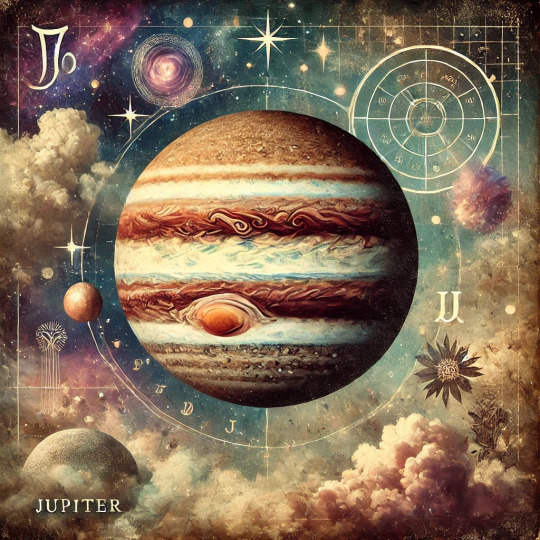
�� Jupiter in the First House
The First House is literally “I.” It’s our personality, our core, the essence of what we call the self. No wonder planets in the first house are almost equal in influence to the Ascendant — they represent our essence, where our soul and destiny are trying to lead us.
So, for people with Jupiter in the first house, the most important thing is to place the emphasis on themselves. And that’s not just about empty slogans like “be yourself,” “put your needs above all else,” or “focus on you.” Yes, that’s part of it, but there are some important clarifications.
How do we be ourselves?
How do we focus on ourselves when there are loved ones around us we want to help?
The most important part of this placement is to understand where destiny is guiding you. The planets in the first house act like inner GPS systems that point the way forward. They can’t make you do anything or force your hand — their role is to direct you. And that’s the hardest part.
It may sound vague — “understand where your destiny is leading you.” But if you dig deeper, you’ll uncover new layers of meaning. For example, you might be a deeply creative and thoughtful person. You know that you need to express yourself through art, ideas, or action. And yet — you work a 9-to-5 office job that completely suppresses your inner self.
Here we find that very “navigator” — it’s blinking red lights, signaling that you don’t belong in a routine, lifeless job.
Sounds a little radical, doesn’t it? Just quit your job — and go where? But that’s not even necessary.
The key is to express those talents and qualities that you already know you have.
That’s how Jupiter becomes active and starts working for you.
This is just one example of how this energy works — but I hope you get the idea.
Find your inner compass and don’t ignore it.
As cliché as it sounds: listen to your heart.
♉ Jupiter in the Second House
The task for people with Jupiter in the second house isn’t exactly easy. You’re here to learn how to love yourself, define your own values, and start truly appreciating your worth.
Sure, that might sound like a psychological training cliché — “Love yourself first and others will love you” — but there’s a deeper meaning behind these words.
What does it really mean to love yourself?
What are these “values” everyone keeps talking about?
The first step is acceptance.
Let me give you an example:
Let’s say you absolutely love sweets and have been fighting that fact your whole life. You force yourself into strict diets, suffer through self-punishment, and deny yourself things you crave. But the moment you accept this about yourself — “Yes, I love sweets. That’s a part of me.” — something shifts.
You might start thinking:
“I love sweets and I’ll eat them — but in amounts that don’t harm my health, because I take care of myself.”
That’s what respect and acceptance look like.
And this approach can be applied to anything in your life.
Find the part of yourself that you constantly battle with, the thing that keeps you restless — and instead of trying to destroy it, accept it. Learn to live with it. Respect it.
Acceptance, care, and love — these are all vital components of Jupiter in the second house.
The moment you stop hating yourself for the things that are naturally part of who you are, and instead embrace them, Jupiter will rise up to support you.
That’s when the blessings come.
♊ Jupiter in the Third House
With Jupiter in the third house, your words, thoughts, and personal ideas become powerful vessels of luck. This planet of expansion and wisdom deeply values your voice — quite literally. It wants you to speak up, to be heard, to share your worldview without fear.
Jupiter craves expression from this placement. It wants your thoughts out in the open, not bottled up inside.
Don’t suppress your true mental flow.
Don’t be afraid to voice your wildest, most “out there” ideas — because those are exactly what make you you.
Here’s the tricky part: many people with this placement fear being judged for their opinions. They censor themselves to please others, to avoid conflict, to be more “acceptable” or agreeable.
But Jupiter doesn’t want agreeable — it wants authentic.
It wants truth, raw and uncensored.
Even if your ideas are unconventional, even if they don’t align with the mainstream, you need to say them. Expressing your truth activates Jupiter’s energy and opens doors that were once hidden.
It’s not about being right — it’s about being real.
People with Jupiter in the third house often have a gift for writing, teaching, public speaking, storytelling — and that’s not a coincidence. It’s Jupiter working through their words, blessing them with opportunities the moment they dare to share themselves out loud.
So make a promise to yourself:
Don’t lie to yourself, and don’t silence your voice.
Even if it’s different. Especially if it’s different.
♋ Jupiter in the Fourth House
People with Jupiter in the fourth house need to find inner wisdom, emotional safety, and stability. Sounds vague, right? But when we break it down, it means discovering your personal emotional constant — a place, an atmosphere, people, or even simple rituals that help you feel secure and at peace.
In this chaotic world, that may seem impossible — but the truth often lies in small details. Maybe it’s an evening alone with candles and a book (yes, cliché, but effective), or a conversation with a longtime friend where you feel completely yourself.
You need grounding — something that shields you from the stress of daily life. It’s also vital to take care of your emotional state: get more rest, sleep, move your body. Do anything that helps your emotional well-being.
Your worst-case scenario? Living in constant rush and stress without time for recovery.
Luck flows naturally to you when you're emotionally connected with yourself.
♌ Jupiter in the Fifth House
Joy, creativity, self-expression — this is what Jupiter wants from you here. It wants you to shine, to show off your talents, to be vibrant, playful, and unapologetically you.
If you're a workaholic, give yourself permission to enjoy life. Laugh. Play. Express your creative gifts. Jupiter here blesses those who allow themselves to experience the beautiful side of life.
Don’t be afraid to take up space, show your skills, be seen and celebrated. The talents you carry were given to you for a reason. When you let them out, when you share your creative essence with the world, Jupiter smiles upon you and brings luck in return.
Joy is your compass. Follow it.
♍ Jupiter in the Sixth House
For those with Jupiter in the sixth house, structure and routine are key — but not in a rigid, punishing way. It’s not about strict discipline. It’s about discovering a daily rhythm that works for you.
Maybe taking a shower before bed calms you (and not everyone does it). Maybe running in the morning gives you energy. Find the little rituals that make you feel stronger, more grounded, more like yourself.
This is how you activate Jupiter’s luck: through consistent, personalized structure.
It’s in the small habits that align with your well-being — that’s where magic begins.
♎ Jupiter in the Seventh House
With Jupiter in the seventh house, human connection is everything — especially one-on-one relationships. You need to build partnerships where giving and receiving are in balance.
But this isn’t just about romance. It’s about all areas of life. You need balance across the board — work, home, relationships — so they support rather than compete with each other.
Finding this balance isn’t easy. One area may always threaten to dominate the others. But when you achieve that sacred harmony, Jupiter brings blessings, love, and mutual growth.
♏ Jupiter in the Eighth House
As abstract as it sounds, people with Jupiter in the eighth house must face their inner demons. You’re being called to dive deep — to uncover the old wounds and hidden traumas still influencing your life.
No, you don’t have to “heal” them completely — trauma leaves a mark, and pretending it never happened isn’t healing. What matters is learning how to live with it, understand it, work with it.
Therapy can be incredibly helpful here. But if you’ve found another path — astrology, art, ritual — that’s great. What matters is your willingness to face your shadows with honesty and courage.
Once you make peace with what’s buried inside you, Jupiter brings unexpected luck and transformation.
♐ Jupiter in the Ninth House
Expanding your mind and your worldview — this is your path to fortune. Jupiter is at home in the ninth house, so everything this planet stands for becomes a source of support.
Travel, study, question your beliefs, evolve your worldview. Seek truth. Learn about the world — whether through physical journeys or reading about other cultures.
When you stay open to new experiences and perspectives, Jupiter responds with generous gifts. The more you learn, the luckier you become.
♑ Jupiter in the Tenth House
For people with Jupiter in the tenth house, direction and purpose are everything. It doesn’t have to be a high-powered career — but it does need to feel meaningful.
The tenth house is about your greater vision — the long-term mission you're slowly and steadily working toward. If the Ascendant shows where you're heading, the tenth house shows the path you're walking.
You’ll face obstacles. You’ll need persistence. But when you align with a goal that feels true to your heart, Jupiter walks with you, helping you grow into your own greatness.
♒ Jupiter in the Eleventh House
The eleventh house is all about dreams, friendships, communities, and shared vision. To find luck here, you need to find your people — your soul tribe.
Whether it's a circle of friends or a Harry Potter fan club, you need community. The kind that understands you and shares your wavelength.
This house also governs your wildest dreams. Don’t shy away from them, even if they feel crazy. Jupiter is here to say — believe in the impossible. You might just make it real.
♓ Jupiter in the Twelfth House
Here, everything revolves around the subconscious. You carry within you both wonders and wounds — hidden layers of your being that need exploration.
Facing buried traumas isn’t easy, but it’s necessary. Learning to live with your shadows is the key to integration. That’s how healing begins.
You also attract luck through compassionate, selfless service to others. Your empathy, your ability to care deeply, is a powerful spiritual gift.
The more you dive into your soul, the more the universe quietly opens doors. Jupiter here is like a guardian angel — working behind the scenes, offering magic when you least expect it.
#astrology#astro#natal chart#astro observations#birth chart#astro notes#astrology posts#astrology community#astrology lover#astrology reading#astrology readings#astrology blog#astrology notes#astrology facts#Jupiter in houses
144 notes
·
View notes
Text
This Is Who JASON TODD is As a PERSON. What His LIMITS Are.
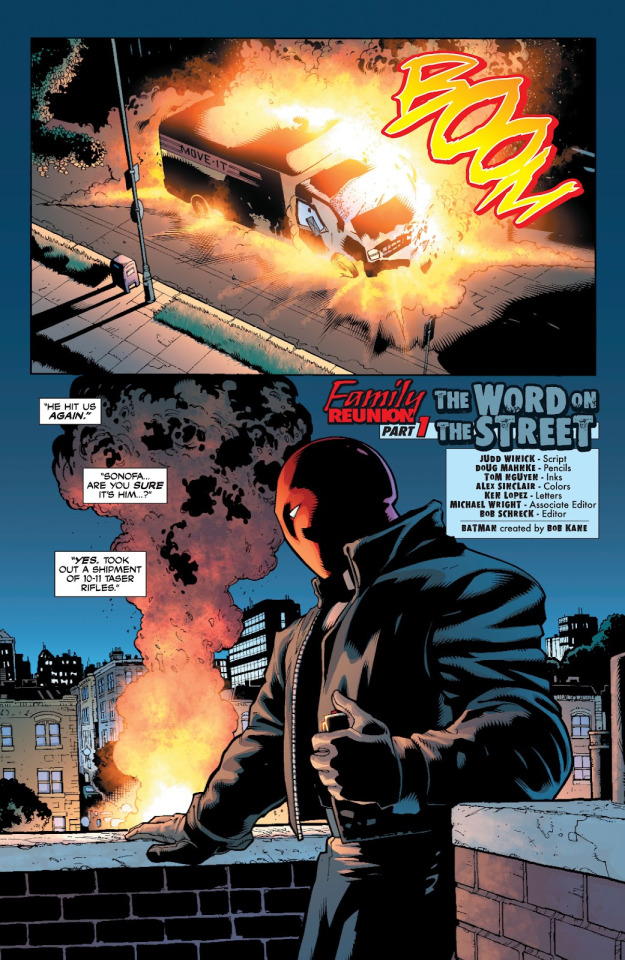
Gosh, how I adore you Jason Todd.
Maybe not as a person--he does some prettyyyy messed up stuff. But as a character, how fantastic you were.
All right, so we talked about Jason Todd's skills a lot. How much of a genius he is. Stuff like that.
But who is he as a person?
What are his limits?
Don't have to answer that. 'Cause I'm gonna show you.
Can't let this post go to waste, can I?
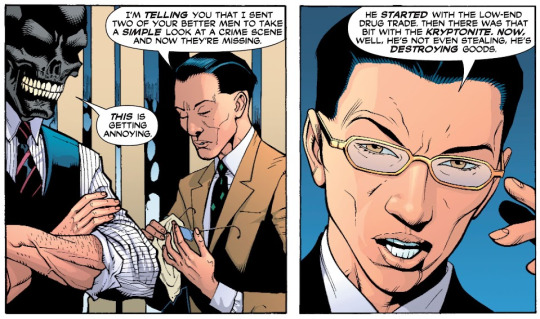
A man who's dedication to stopping crime is far more fierce than maybe any other character in the main DC Universe. He often seems like he's playing around, but he never actually is as we discussed before.
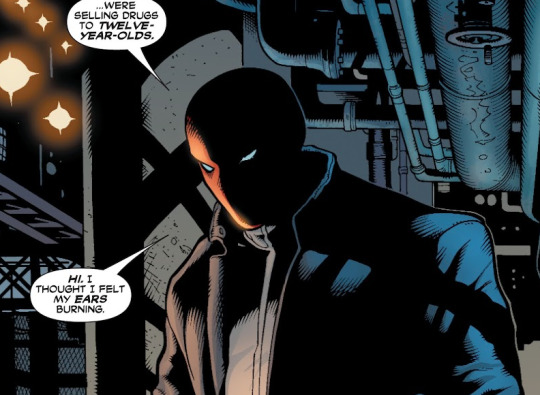
Damn I miss when Jason Todd was scary.
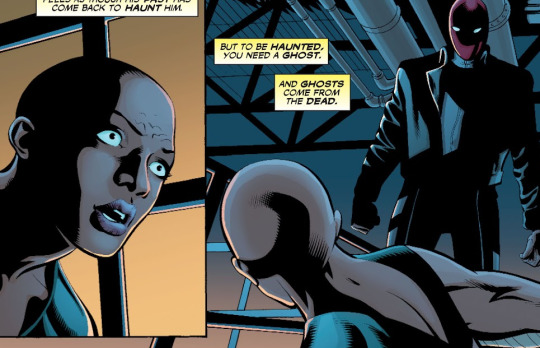
People draw and write him like he's a 90s anti-hero or something.
No, he's a horror character for bad guys.
That makes him so damn cool and appealing. He's scarier than even Batman. And that says a lot.
He's shown to kill them without much care, unless he's actively using them, or manipulating them and the what not. Up to this point we really haven't seen what his limits are. Heck, I skipped it, but him leading Batman and Nightwing right to Amazo might make it seem like he has nothing against killing good guys.
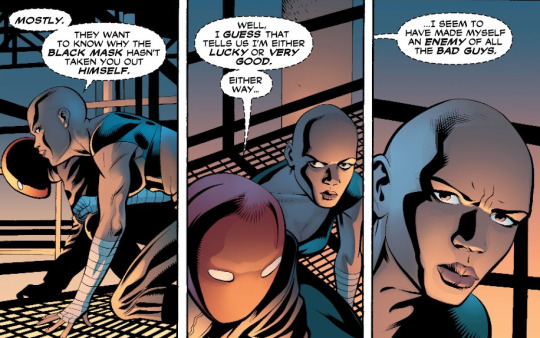
Not the case.
He does not kill heroes.
While nowadays they softened Jason up so much he's barely recognizable. Close to the immediate aftermath of Under the Hood, some writers outright wrote him to be a murderous villain that'd kill anybody
That's horse shit.
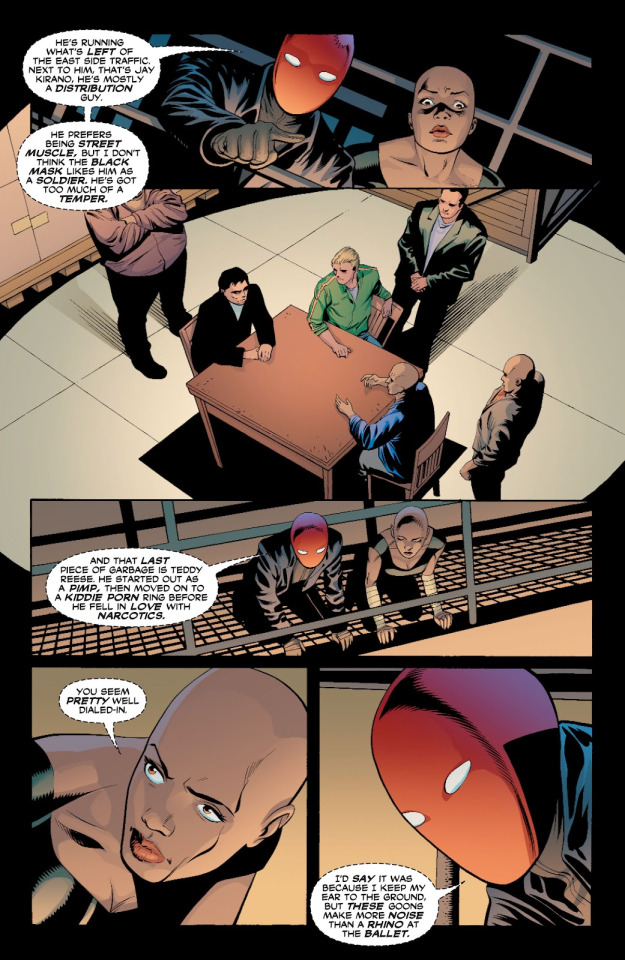
Jason Todd is the most anti-hero, anti-hero, to ever be an anti-hero.
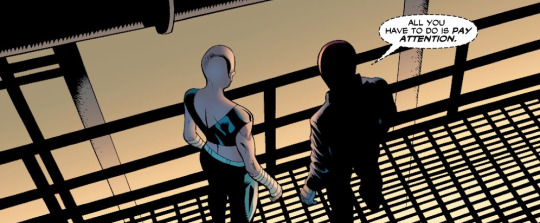
He wouldn't say he plays nice.
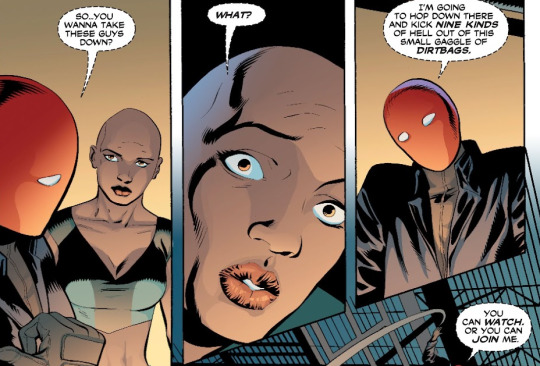
But you don't exactly see him killing her to get out of his way do you? Is he tying her up in some boobytrap 'cause he's a sadistic psycho? No.
Pit madness is mad up by fans to excuse Jason's behavior in comics like Teen Titans where he tried to murder Robin/Tim Drake, and later on in Nightwing where he was murdering anyone to ruin Dick's reputation.
When in reality that was all just bad writing.
Seriously, guys, it's fiction. You don't have to make up excuses. These guys aren't Gods that write this stuff. They make mistakes like the rest of us. Gotta learn to accept what is once in a while. Easier on the blood pressure.
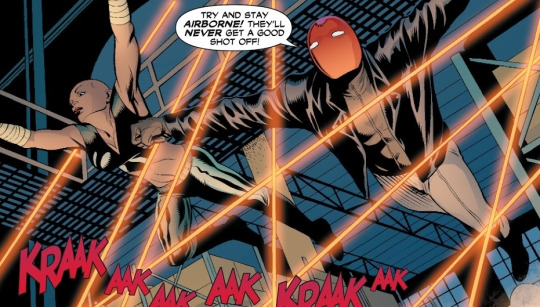
I mean, damn, he's genuinely quite helpful in fact. Showing off his intelligence to help Onyx
What you don't remember Onyx? I can't--You're serious--?I mean--
I don't remember her either. I don't really care.
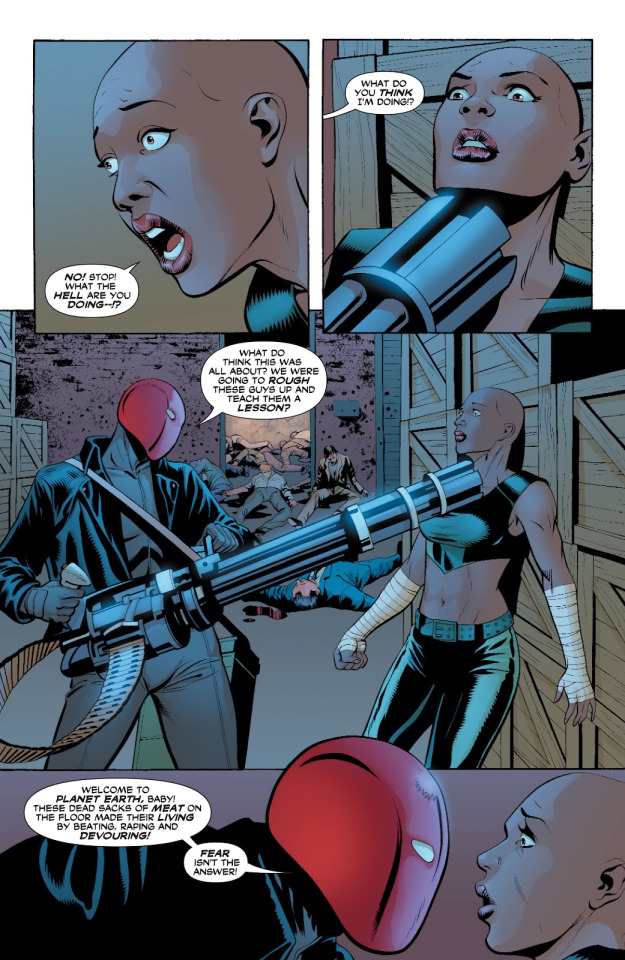
Just don't mistake his kindness for weakening of his own moral code. He does not back down. He will not back down. He refuses to back down. His mission is the most important thing to him. He won't kill you if you didn't do anything wrong.
But do not think you can get in his way.
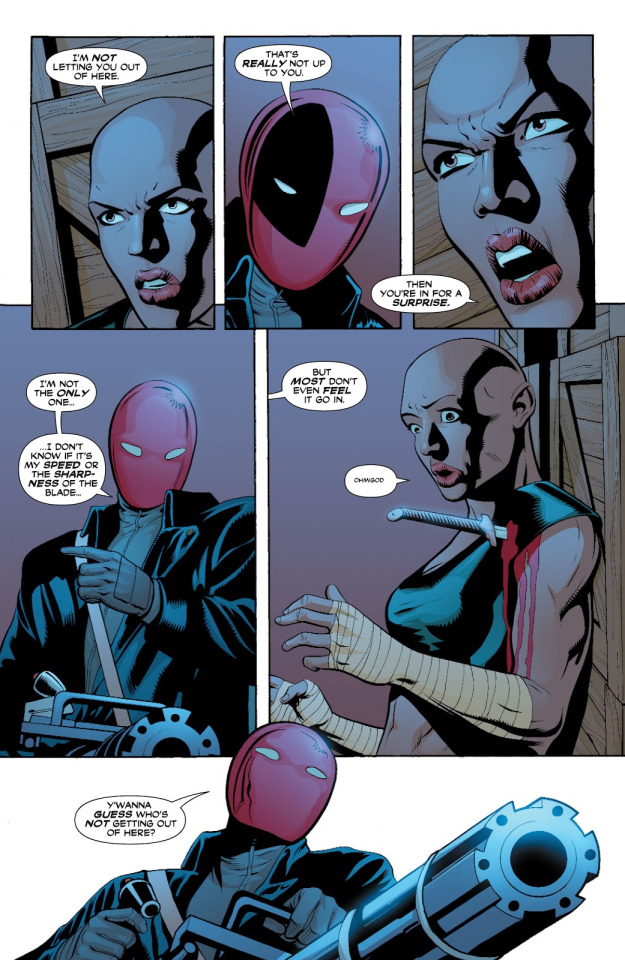
He's that sort of a man.
Damn, I miss how cunning Jason used to be. It's soo gooood.
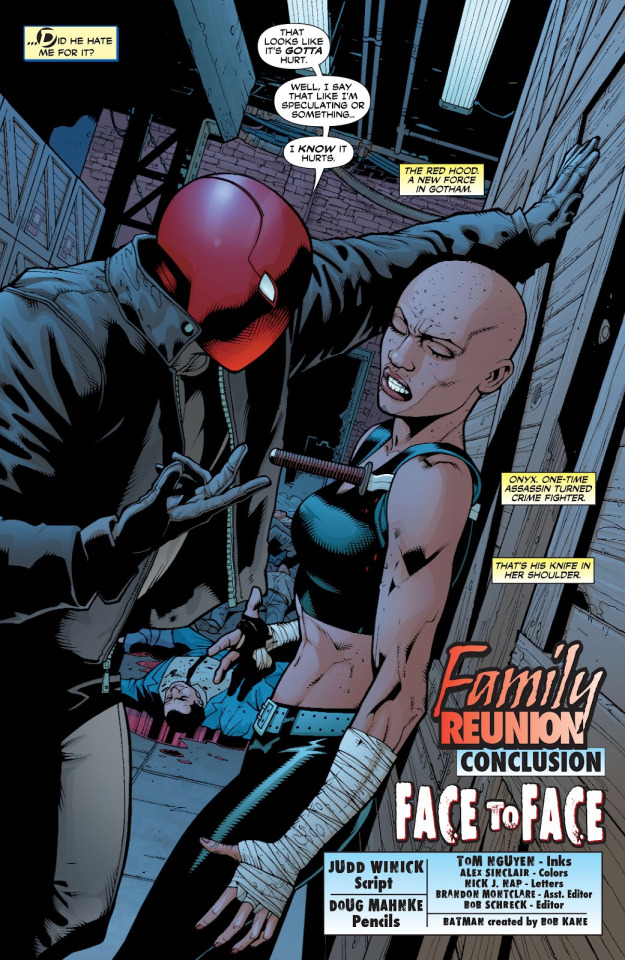
The confidence on this man makes even a nasty man like himself feel oddly likable despite his horrible and violent actions.
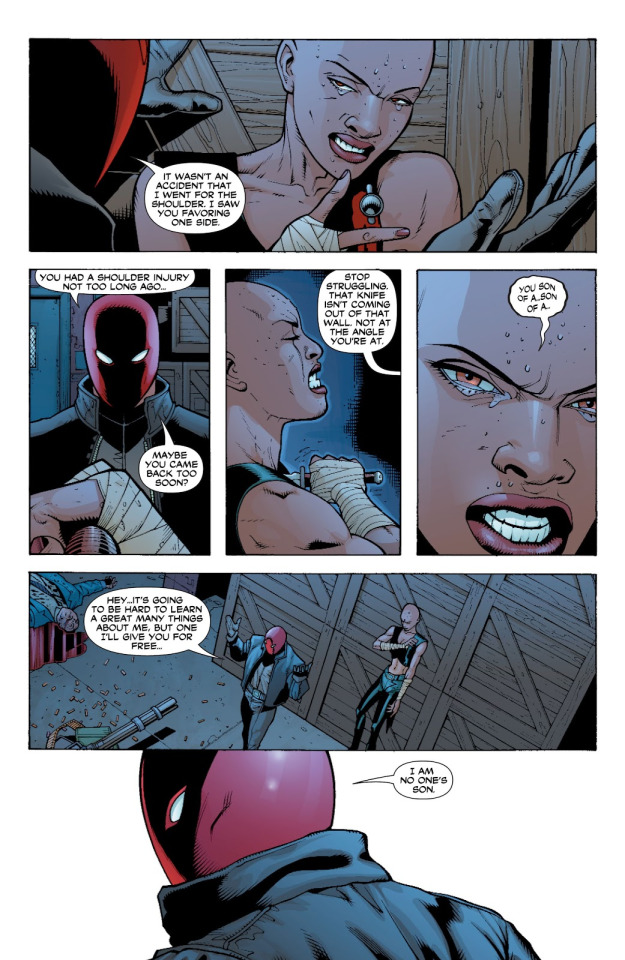
Art-wise, I love how he goes back to shadow-y and scary looking once he reveals his darker nature. It's extremely good visual story-telling. Could be them representing the lighting only.
It really works for it's benefit though in ways they may not have realized.
Still great stuff regardless.
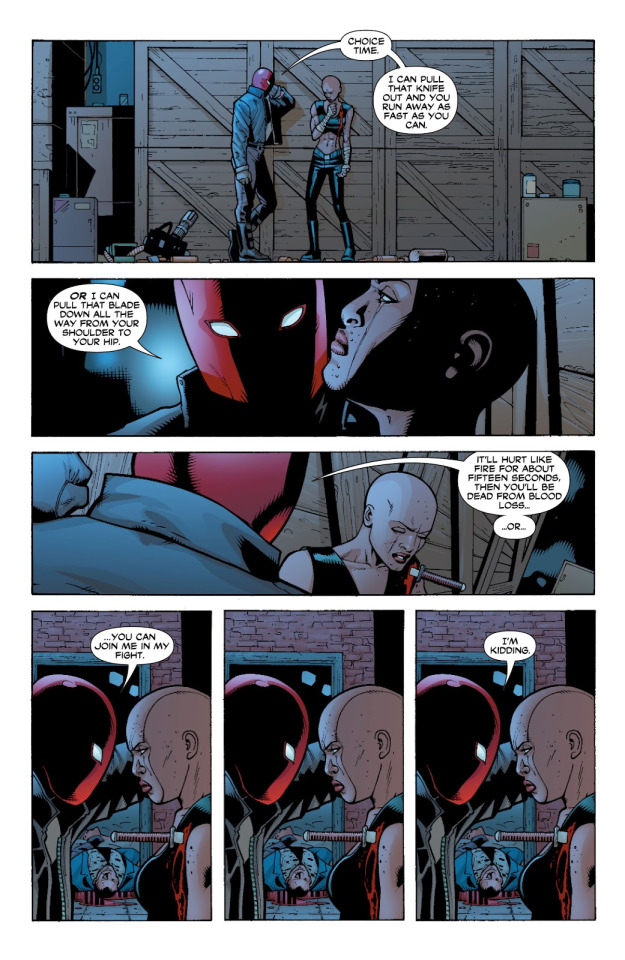
He is scary as hell. Menacing. Calculated. Cunning. Genius. Never to be underestimated. Knows how to play people right where he wants them.
I've said it before, and I'll say it again, but Jason Todd is one of the smartest members of the Bat-Family. He managed to out work BATMAN AND NIGHTWING for crying out loud. You don't just do that. And Batman acknowledges that it isn't luck either.
Intelligence comes in many forms. When it comes to manipulation and tactics though? It's Jason's ballgame. He's the one in control.
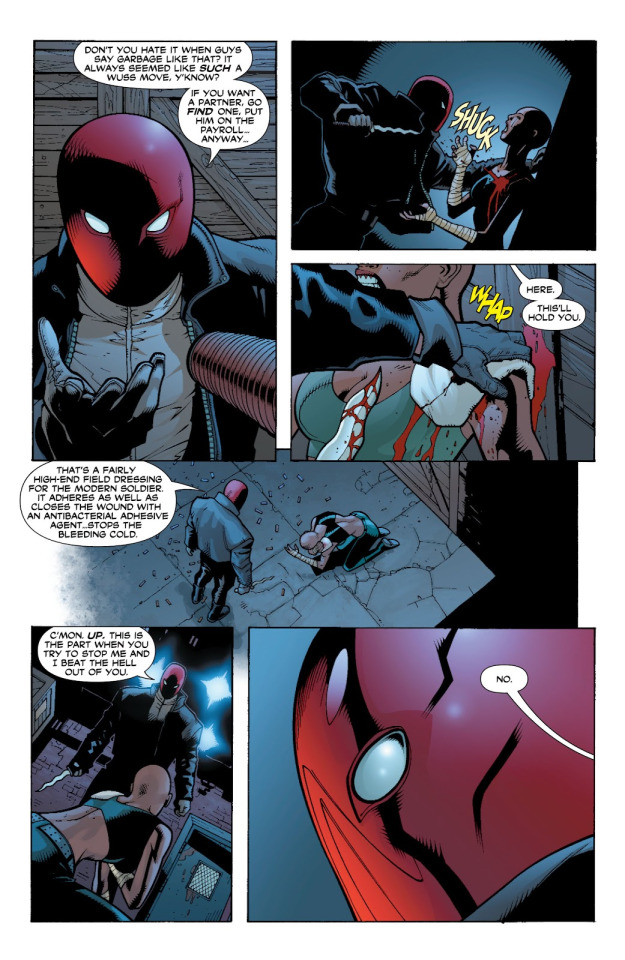
Still doesn't mean he'll kill anyone only for the sake of it. He actively helps clean the wound he causes. It's a very insightful character moments that let's you get inside the head and moral code of Jason Todd.
Shows you he's not another villain like that.
He's far more complicated than that.
So of course some writers had to be lazy and change that--
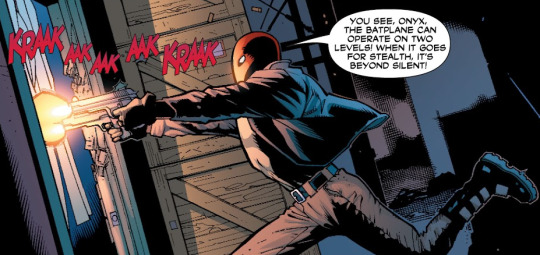
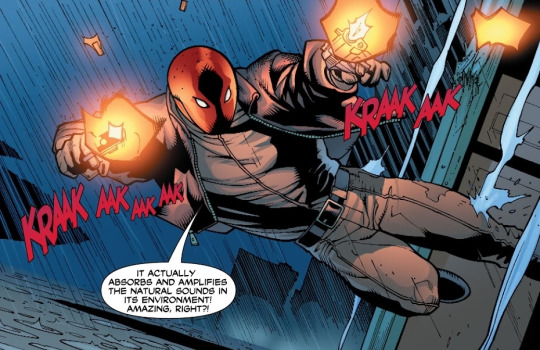
Love this big, scary, intelligent bastard of a man.
No ones out here doing it like Jason Mother Saving Todd.
74 notes
·
View notes
Text
One of the more under-appreciated aspects of this film is how despite being the representative and executor of an (in terms of narrative) antagonistic force, Bubbles himself really does just want what’s best for Lilo and is actively trying to help Nani to be the one to provide it. He’s not some scheming villain trying to take this child away, he just wants to see her properly provided for and is willing to do whatever it takes to make that happen… even if that means taking her away.
Give it up to Cobra Bubbles regaining his composure and going back to business with Nani after having Stitch randomly chuck a heavy ass book at his face like that.
He probably was fuming by the time he got into his car after his shades became a casualty of the attack.
31K notes
·
View notes
Text
Recently rewatched the Gaslight District Pilot (again) and my favorite scene is still the very last one, the Human Death Ceremony.
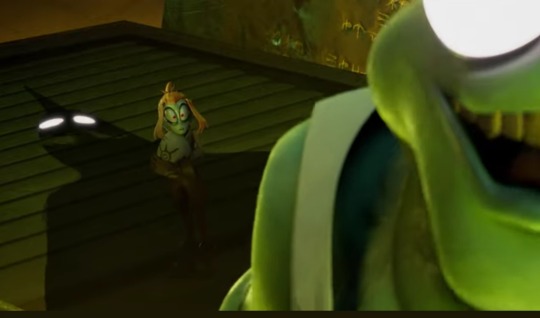
Just the way Mel starts protectively hugging the egg close to her as Ken talks about destroying the prophesised human to maintain their eternal life... like it's an act! it's a lie! she knows Ken is just decieving everyone, this was what her whole plan was for! But her deep seated desire to belong and be accepted by her family as she is, means everything he's saying about how the human child born of the angel's egg will never belong and find peace in their lands, is hitting on all her inner fears and insecurities. Because even though it's a lie, there is a bit of truth in the lie of what Ken's saying for Mel, because he's said things of a similar nature that cast her as an outsider in her own family:
Ken: You're not one of us. And you never will be.
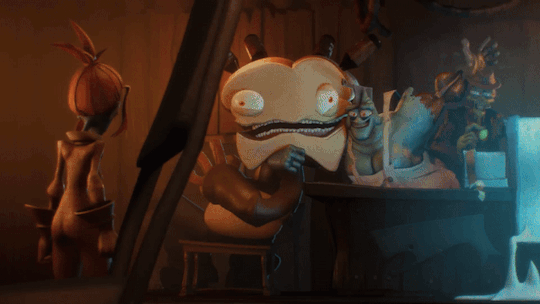
Even though in this scene he says it out of a desire to protect her, it's incredibly isolating for Mel, especially within her own family, especially coming from Ken, who she craves the approval of, who is the only one who knows she's human and loves her/has raised her.
Like even the framing with Mel being physically seperated and divided is the same, though in the Human Death Ceremony it's by the spike, a division that's much more harsh and hurtful (as it's the fate that awaits her if her true identity is ever revealed)

Much like the words Ken says that Mel is so afraid to hear him say to her:
Ken: Rotten little human hidin' in that egg, listen, and listen good. You shall never find peace in our land... as we will bathe this spike in your black blood time and time again. For you are the one thing to threaten our gift of eternal life. Now, let us rejoice in our victory! Let us restart the cycle! Let us praise the black hand for ANOTHER 10,000 YEARS!!!
...and that's when she starts projecting onto the angel's egg and pulling it close to her as if to protect it:

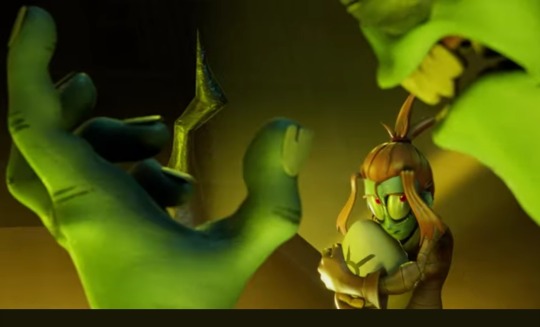
It represents the part of herself she wants to hide and initially to kill, (she came up with the plan to steal the angel's egg and smash it in front of the whole town, as a plan to cover up her identity as the real human born of the angel's egg). Being human means being vulnerable, mortal, fragile as an egg, all things she believes she needs to reject to belong and be part of her family:
Melancholy: (Giggling) I'm invincible! Me! A member of the Smiling Dead! (Laughs, then passes out)
(Ken looks at his daughter with a sad and disappointed expression on his face, not wanting her to be like him)
Ken: (Sighs) I'll make sure you never end up... like one of us.
But her humanity is a part of who she is, and Mel, I think deep down wants to be accepted and loved for her true self, which includes being human.
Additionally Mel could've easily still smashed the egg once she saw it was starting to hatch and gotten away with her deceit. But she hesitates, and instead pulls it close to her again to wait and see what hatches.
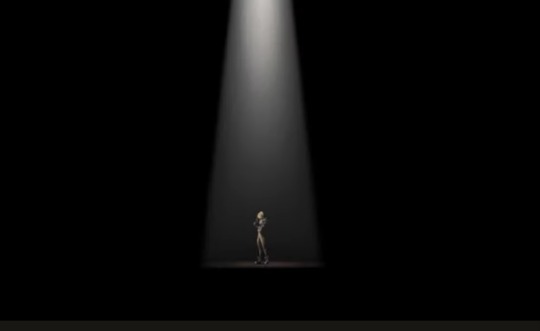

And still holds on to the angel bird hatchling after being found out.

The hatchling, if it's similar to most baby birds, will likely imprint on Mel, as well as the fact that the angel birds seem to keep a close eye on Mel as the prohesised human child.
Mel is likely going to see this bird baby as an extension of herself based on how she was projecting onto the angel's egg even before it hatched. The angel's egg that has been stolen from the heavens and is (hopefully, unless it's killed horribly/forgotten about in the next episode and I end up eating my words) going to be raised in the Gaslight District within a found family much like Mel herself was. The angel birds seem to bleed black blood like she does too, so in various ways it represents a side of Mel that she's forced to hide away and is convinced is unlovable.
...But maybe through accepting and loving the baby angel she can find a way to love and accept herself as a whole, her human/angel side included.
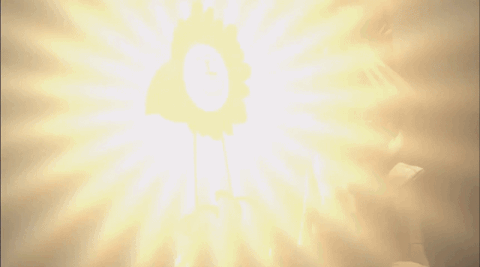
I just. I love love LOVE when a protagonist gets attached to A Little Guy that represents healing/reconnecting with their inner child!!!
#the gaslight district#tgd#melacholy hill#ken the butcher#the gaslight district meta#the gaslight district analysis#the gaslight district theories#here's hoping Mel and Baby Angel will enter the healing your inner child duos#like Ruby/Little and Kyoko/Maria and Jinx/Isha#also other people have definitely said this but omg I want a plushie of the angel bird so badddddd
55 notes
·
View notes
Note
I noticed you wrote Levi had OCD. Is that confirmed or just headcanon? I always see it floating around but was unable to confirm it anywhere but I might be missing something. I know he is very cleanly, but someone with OCD probably wouldn’t turn around and get dirty right after. But surely it might be different for everyone so if that was Isayama’s intention than I stand corrected.
(Also this is not meant to be taken hatefully. I truly am just curious and you seem so knowledgeable and trustworthy compared to other blogs if I am honest with you)
OMG, I’ve been meaning to do this deep dive for the longest time. Thank you for the perfect excuse!
First, I want to start this conversation by saying I’m not a doctor or psychiatrist, so my knowledge comes from research and general information I’ve gathered over time. That said, I believe Isayama unfortunately fell into the stereotype — and actual misinformation — of implying:
“Cleaning or being organized = OCD.”
This is a really common stereotype, both in fiction and real life. People casually say things like “Ugh, I’m so obsessive, I need all my t-shirts perfectly organized, I totally have OCD haha.”
But in reality, OCD is very different and much more serious. Yes, OCD can present itself through obsessions with germs, symmetry, and cleanliness, but there’s a specific “pattern” to it that goes way beyond simply liking things neat.
OCD stands for Obsessive Compulsive Disorder, and that name is really important to break down. There are actually multiple types of OCD, and if anyone’s interested, I really recommend listening to people with real, diagnosed OCD share their experiences. It’s a complicated, often misunderstood mental illness, and it isn’t as well-known or represented accurately as people think.
The one defining feature of OCD is:
Intrusive Thoughts.
And I’m not talking about the meme version of intrusive thoughts, like “haha I had an intrusive thought to jump off the sidewalk.” No, real intrusive thoughts are a constant, terrifying loop of ideas that can range from mildly irrational to completely overwhelming. For example:
“I need to double-check that email to make sure I didn’t say something wrong.”
…to…
“If I don’t jump on my bed ten times and flick the lights on and off exactly fifteen times, my entire family will die.”
As silly as some of these might sound to an outsider, for the person with OCD, they become real. The obsessive part of the mind repeats these thoughts so much that they start to feel true, even when they aren’t. That’s where the compulsivebehaviors come in — the person performs “rituals” to temporarily quiet the anxiety those thoughts cause.
The problem? These rituals only bring relief for a short time. The intrusive thoughts come back, stronger, more overwhelming, and the cycle deepens.
OCD varies from person to person, and yes — there is a type of OCD focused on cleanliness and symmetry. But ironically, those with “cleaning OCD” often aren’t actually clean, because their brain convinces them things are never clean enough. For example:
They just organized their wardrobe? Great… Except no, their mind tells them it’s contaminated again. Someone touched that corner two days ago — what if it’s covered in germs? What if it has chickenpox? Now they must re-clean it — right now, now, now.
This is why OCD is so exhausting and why it requires treatment and support. It’s not something you “turn off” because you have work to do — it consumes people’s lives.
Now, about Levi…
Levi never shows signs of intrusive thoughts in the story. He never feels the compulsive, overwhelming urge to clean something again and again because his mind tells him it isn’t done right. In fact, we constantly see him put aside his cleaning habits the moment the situation demands it. Someone with true cleaning-related OCD wouldn’t be able to do half the things Levi does:
He pauses cleaning because of an urgent meeting in the cabin.
He gets covered in dirt, blood, and even picks up Eren covered in Titan saliva — completely unfazed.
In A Choice With No Regrets, he falls into a barrel of oil, and what does he do? Clicks his tongue in annoyance, gets help cleaning up, and moves on.
Someone with genuine cleaning OCD would’ve been panicking. There’s even a type of OCD where people feel the compulsive need to scrub their body or wash their hands raw after experiencing anything they consider “dirty” or “contaminated.”
Levi? We never see behaviors like that. Not even close.
That’s why I strongly believe Isayama simply fell into the harmful “clean = OCD” stereotype, using it mostly for comic relief. Levi’s cleaning habit in the story is exactly that — comic relief. The moment something serious happens, it disappears. And if you noticed, as the story progresses, even the “cleaning obsession” fades away entirely. It used to show up all the time in early chapters — toward the end? Almost never.
In fact, under the amount of stress Levi faced in the later arcs, someone with real OCD would’ve shown worseningsymptoms, not fewer.
So no, I don’t think Levi has OCD.
And honestly, that’s why I avoid exaggerating the cleaning thing in my stories, or I keep it at a level that just makes sense for a normal, neat person — because when you look closely, the OCD narrative doesn’t really hold up.
Now, if you asked me, “Then what does Levi have?” — I’d say it’s more of a control issue than OCD.
Control issues often stem from trauma — the belief that if you control everything around you, nothing bad can happen. Levi’s controlling nature shows more in how he handles people and situations than in obsessive cleaning.
A good example? When Erwin decides to go on the Retake Wall Maria expedition, Levi feels powerless and frustrated — so what does he do? He overreacts, beating Eren and Jean more than necessary, trying to reassert control. Even Hange points out that he went overboard.
Basically: “Erwin’s doing something I can’t control — fine, I’ll control something else. The kids are acting up? I’ll remind them I control this.”
If Levi had true cleaning OCD, he’d be scrubbing the mess hall floors while everyone else is out drinking beer — but he’s not.
Ahh, I’ve been meaning to write this analysis for so long! Thank you for the opportunity!
And omg, thank you — don’t worry, I didn’t take your ask in a bad way at all! I really appreciate that you think I sound trustworthy, haha. 💕
Have a lovely day!
38 notes
·
View notes
Text
God Is the Mind, and We Are the Mirrors
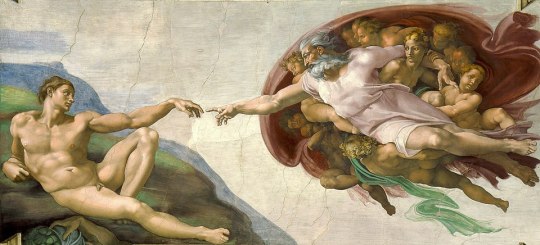
When I read the Bible, I don't just see a religious document. I see a coded map of human consciousness. A guide to the inner world, about what happens inside us every day as we navigate belief, doubt, identity, and awareness.
The line that we are made in the image of God has always stood out to me. From a psychological lens, this phrase isn't about our physical form. It's about our structure. Our ability to imagine, to reflect, to create. We are built with the same creative intelligence that designed the ecosystems and the stars. That same creative mind lives within us, and through us. Not as a poetic express, but literally.
The brain is wired for pattern recognition, memory, and story. The subconscious does not filter for truth or logic. It receives what we give it, especially when repetition and emotion are involved. That means your beliefs, whether inherited or chosen, shape how you perceive reality and how you respond to it.
Your imagination is not a fantasy, it is a neurological event. When you vividly imagine something, your brain responds as if it's real. It lights up similar pathways as it would during lived experience. This is why fear can feel so physical, even if nothing is happening, and why hope and vision, when held with focus, can begin to rewire your behavior and outcomes.
This is the foundation of manifestation. It's not a mystical exception to science. It works because your inner world influences your actions, your nervous system, your expectations, and how you interpret the world around you.
The Bible's stories reflect this inner journey. Eden represents a clear, undistorted state of mind. No shame, no doubt, just presence. The serpent is the first intrusive thought. The idea that you are not already whole, that something outside of you needs to be chased.
Egypt, in the Bible, represents mental slavery. A state of limitation, survival mode, and external control. The Exodus is about coming out of that. Not geographically, but psychologically. Leaving behind the old identity that says "I can't" or "I'm not enough" and walking into a mindset of sovereignty.
The story of the golden calf is another powerful metaphor. After being led out of Egypt, out of that state of mental bondage, the people panic when Moses disappears up the mountain. In his absence, they build an idol out of gold and start worshiping it. Psychologically, this reflects what happens when we doubt our inner connection. When the path feels uncertain or when the results are not instant, the mind looks for something external to cling to. The golden calf represents the tendency to return to old patterns, to seek validation or power outside of ourselves even after we have had a taste of freedom. It shows how easily fear can lead us to recreate the very systems we have outgrown. True transformation requires trust in the unseen, patience with the process, and the willingness to stay present even when the ego wants to grasp for something familiar.
Jesus embodies the awakened mind. He taught that the Kingdom of God is within. Not in a faraway place, not in a temple, but already inside you. When he performed healings, he didn’t say "I did this." He said, "Your faith made you well." Because belief alters the body. It shifts the mind. It realigns us with the part of us that never forgot.
One of my favorite examples reflecting these beliefs is in Michelangelo's The Creation of Adam. Behind the figure of God is a flowing red cloak. If you look closely, the shape of that cloak is an anatomically accurate outline of the human brain. God is not floating on a cloud, God is emerging from the mind. Whether Michelangelo knew that or not, the image speaks loudly. Consciousness is the source and creation flows from within.
We are creators. We influence life at the level of awareness. We hold the brush when it comes to how we see ourselves, what we accept as true, and what we emotionally invest in. The subconscious organizes itself around these inputs.
This is why your beliefs matter, this is why your imagination matters. You are not just a passive observer, you are participating, and you are shaping. Your nervous system responds to your thoughts, your habits come from your assumptions, and your life reflects your focus.
We are not fragments of God in the way a piece of a whole is incomplete. We are each expressions of the whole. The same consciousness, localized. Different voices, same source. That is why what you believe about others is reflected in you. That is why compassion is wisdom, and judgment is blindness. You are always talking to yourself in another form.
To know God is to recognize your own capacity to create, to choose, to reflect. God is not watching from afar. God is the breath behind your thoughts, the silence beneath your doubts, the awareness that has never left you. Not for a moment.
#loa#law of assumption#loa blog#loa tumblr#loablr#manifest#manifesting#manifesation#mirrorology#psychology#religion#god#blog
50 notes
·
View notes
Text
the second part is much less coherent than the first but most of the claims in general seem silly
>The fundamental problem is that the process of aggregating content and creating output based on that aggregation is going to inherently lead to the blandest possible outcome.
this part blames synthetic data which is a very strange take considering models that don't use them aren't any less bland. like if that's "the fundamental problem" we can just skip that part of training.
>Human artists draw inspiration from earlier artists and work within an artistic tradition, but they also can choose to rebel against tradition or against specific aspects of traditions. .... the fact is that the complicated interaction between conformity and contrarianism is what makes art interesting.
OP seems to heavily overestimate the weight of rebellion on why art is interesting for the sake of justifying why ai art isn't. not only is this artist sentiment prevalent in a narrow timespan of the history of art (even within these times it was represented by one out of multiple concurrent art movements), it ignores all other factors that go into making art styles diverge (some of it subconscious to the artist) like:
personal creativity
growing technical sophistication
inspiration from older times
admiration of foreign people
change in market tastes
current events and cultural atmosphere
the appearance of new mediums
religious lore
miscommunication
>Al is not capable of internalizing the values of an art movement
if we ignore the unwarranted emphasis on art movements, I don't understand the apparent assumption that AI model selects its own prompts. When I look at a photograph, I don't consider that the camera behind it couldn't even comprehend the subject matter, I think of the photographer! The AI model doesn't need to "internalize" any value whatsoever as long as the promopters can describe the piece in a way to get the result they want.
>it doesn't actually correspond to anything in the material world. Since matter can't be created or destroyed, pure negation is impossible;
what the fuck does this even mean?
>There's no such thing as "the opposite of a chair." In the realm of aesthetics this mean you can't replace an aesthetic value with an "opposite" aesthetic value, you can only replace it with what you judge to be "the most different" aesthetic , which is always going to be somewhat subjective.
please consider thinking of some "aesthetic values" and try to find whether they are just negations of artist values that are themselves negations all the way into the first cave paintings, or if they are born for and are reflective of the conditions and cultural concerns of their time. This conception cannot be more reductive of the process it intends to venerate.
The era of interesting AI art is pretty much over. The glitchy early generations were fun, but as the kinks get ironed out it has become boring. The fundamental problem is that the process of aggregating content and creating output based on that aggregation is going to inherently lead to the blandest possible outcome. Human artists draw inspiration from earlier artists and work within an artistic tradition, but they also can choose to rebel against tradition or against specific aspects of traditions. People tend to roll their eyes at the idea of being contrarian (see: all the mockery of hipsters throughout the years, as well as people being mad at dadaism for "not being real art"), but the fact is that the complicated interaction between conformity and contrarianism is what makes art interesting. AI is not capable of internalizing the values of an art movement, imagining what the opposite might look like (and again here there is a space for creativity: any given set of values can have more than one set of opposing values to choose from*), and intentionally doing the opposing thing. Art based purely on synthesis is always going to be bland and forgettable. *To drill down more into the "each set of values can have more than one opposing set of values" idea: the fundamental issue is that "negation" is a part of human psychology, but it doesn't actually correspond to anything in the material world. Since matter can't be created or destroyed, pure negation is impossible; things can only be transformed into other things. Even the idea of "opposition" is a figment of human psychology. There's no such thing as "the opposite of a chair." In the realm of aesthetics this mean you can't replace an aesthetic value with an "opposite" aesthetic value, you can only replace it with what you judge to be "the most different" aesthetic value, which is always going to be somewhat subjective.
457 notes
·
View notes
Text
OK here's my rant...
1. It’s completely okay to support Nicola and Jake and find them adorable. It doesn’t make you weird to enjoy seeing cute photos of them or to be happy for them. You’re not hurting anyone by liking them as a couple. Supporting Jake’s work after being introduced to him through Nicola is also fine. That doesn’t make you a fake fan. It just means you discovered someone new and ended up liking what they bring to the table.
2. If you’re a fan of only Nicola and don’t really care about Jake, that’s also valid. You’re not less of a fan for staying focused on her. As long as you’re respectful, you’re doing just fine.
3. You can like Nicola and Jake and still like Luke. There is zero competition between them. No one is being forced to pick sides. Liking one doesn’t cancel out the others. You can also stan Luke and NOT hate on Jake or the people who like him.
4. Just because some fans are unbearable and thrive on drama does not mean you have to start hating the person they stan. The worst fans don’t represent the people they obsess over. You don’t need to mirror that energy.
5. I consider myself primarily a Nicola fan, but over time I’ve come to really like Jake too. I love seeing them together and I like them as individuals. I honestly don’t care who thinks that’s strange. I’m not making up conspiracies. I’m not trashing anyone involved. I also like seeing Luke and Antonia together and think they’re cute. No amount of fan wars or petty drama is going to change how I feel about any of them.
But FUCK the people who lie and launch defamation campaigns against real people just because they are miserable, bored losers whose only excitement in life comes from starting drama online. Yeah those people can go to hell.
33 notes
·
View notes
Text
The ending of Thunderbolts is Nonsensical Part 2: How not to Conclude a Story
For this part of my analysis of why the Thunderbolts ending doesn’t work, I’m going to go into how it simply fails as a piece of storytelling. Essentially, by going along with Val’s plan, the Thunderbolts fail to actually redeem themselves like the movie claims they do.
Val acts as a pretty straightforward villain in this movie. She brings the protagonists together by going after all of them. She sends the antagonist, Sentry, after them. She unleashes the Void on New York, leaving the Thunderbolts to stop it. She is behind everything, and she provides motivation for them to work together.
At the impromptu press conference, Val presents the Thunderbolts with a temptation. She is trying to give them something they want in order to continue with her evil plans. Because what (most of) the Thunderbolts want actually is encapsulated by becoming the “new Avengers”. As much as Yelena mocked Natasha for being a “poser”, as much as she claimed that the Avengers meant nothing, that all they did was take her sister from her, I think that she does want what the Avengers represent. She wants to be part of something bigger than herself, she wants to do good, to redeem herself. She wants companionship, to be surrounded by people who understand her. And she doesn’t want to actually confront and own up to the crimes she’s committed by working for Val. While the movie clearly barely covers Ava, we are left to assume that she feels along the same lines as Yelena. As for John and Alexei, they have even more reason to be tempted by Val’s offer.
John Walker ruined his life with his obsession over being Captain America. All of his feelings of insecurity about taking on the title, his resentment towards Sam for being the one to actually inherit the shield, his feelings of nationalism that he associates with the role, make him throw away everything good in his life. He gets Lamar killed because of his own pride, because he refuses to just let Sam and Bucky handle the Flagsmashers. He commits a war crime by killing a surrendering man, then tries to kill Sam and Bucky, causing him to lose his entire career. He remains fixated on this failure years after the fact, causing him to ruin his relationship with his wife and infant child. All of these problems happen because he is obsessed with the idea of being the one in charge, the kind of man who is always right because he is white, violent, angry, and forceful. So of course, for him, the idea of getting made into an Avenger is perfect, it's exactly what he wants. Rather than challenging his mentality, it validates his attitude.
As for Alexei, he is similar to John in a lot of ways. For all his life, Alexei was obsessed with the idea of being the Red Guardian, a popular superhero loved by the people. He wanted to be on cereal boxes, he wanted action figures made of him, he wanted to be the kind of person people recognized as a hero. He wanted renown and glory more than anything else. This is why he resented his undercover mission at the beginning of Black Widow. He literally traffics a young Yelena and Natasha because he wants to go back to being a public facing superhero. And while he seems to recognize the error of his ways at the end of that movie, by the time of Thunderbolts he’s back on his bullshit. So of course he would really want to go along with Val’s plan. It would mean finally getting to live out his fantasy.
As for Bucky, I’ll be honest this choice just makes no sense. I just have to put a pin in that and say that this is a Skrull, because nothing about Bucky’s story has ever implied that he would want to be part of any team that didn’t include Sam. As for Bob, he’s also just such a mystery that I don’t really know what his motivations are. It doesn’t seem reasonable that he’d want to work for the woman who experimented on him. So I’ll just put a pin in Bob as well and just say that a lot about him makes very little sense in this movie.
So it’s reasonable that Val’s offer would be properly tempting to (most of) the Thunderbolts. But that’s exactly why, if the story was actually good, they would need to reject her. Because this movie is supposedly about redemption, a group of people who want to turn their lives around despite all they’ve done. And, by stopping the Void and saving New York, they’ve started down that path. But, as others have pointed out, it isn’t exactly a redeeming act. Frankly, anybody would feel motivated to keep a city from being consumed by a big shadow depression monster. Mostly so they also don’t get consumed by it themselves! Like, Wilson Fisk would have also probably tried to stop the void from eating the city he’s trying to violently rule. I would describe this, in Dungeons and Dragons terms, as a “true neutral” act.
Meanwhile, rejecting Val’s offer would actually demonstrate their commitment to doing the right thing. And the right thing would have involved the Thunderbolts publicly rejecting Val, to help bring her to justice for the things she’s done. To provide their own testimony to attest to her crimes. Even if that means risking their own freedom. That’s doing the right thing, that’s an actual redeeming act.
This isn’t an unreasonable expectation I have for this story. Instead, this is a basic storytelling element - the hero rejecting the villain’s temptation. Think about it: “we can rule together, father and son!” "take his place at my side!" , this is a common refrain for a reason. So many stories are about the hero thinking they want something, but when the villain offers exactly that, the hero realizes that’s not what they need at all. Val calling the Thunderbolts the “new Avengers” in front of the whole world is such a perfect setup for this dramatic rejection. An opportunity for the Thunderbolts to demonstrate what they’ve learned throughout the story (acting like the story had them learning anything, but I digress). But instead, it's completely wasted. And, as I’ve gone more into detail about in the first part of this analysis, the idea that the Thunderbolts are actually blackmailing Val doesn’t work. Beyond it not making sense logistically, It's also not dramatically satisfying in the same way as helping bring her to actual justice would have been.
It's honestly pretty funny to compare this ending to any story that actually makes sense, especially in the MCU. Imagine if the Guardians of the Galaxy just handed over the power stone to Ronan in their first movie and just, like, asked to be on Thanos' payroll. Imagine if Tony had just let Obadiah Stane just continue selling weapons to whoever and asked him for an extra cut of the funds. That version of those movies would be trash, right? That would ruin the whole point of the story and those characters, right? And yet?! That’s what Thunderbolts does?! Lmao?!
#anti thunderbolts#mcu critical#anti john walker#anti alexei shostakov#not my bucky#tb bucky is a skrull#skrull bucky#this movie coming out on digital and getting more discussion only fuels me more
32 notes
·
View notes
Text
What Season of Mists Can Teach Us About Hope In a World Caught Between Cancel Culture and Toxic Positivity
The Netflix adaptation of Season of Mists has finally landed, and I always thought that SoM holds the most profound lessons about hope (I know it’s not immediately apparent, but bear with me) because it operates on a level that speaks directly to our anxieties about redemption, second chances, and the possibility of change. This analysis is mostly about the SoM arc as such and heavily based in the comics, but it makes references to the show (just in case you want to avoid spoilers).

The Hell of Our Own Making…
Season of Mists begins with Dream’s decision to rescue Nada from Hell, a choice not truly born from love, but rather from guilt and growing self-awareness. This distinction matters, because Dream doesn’t suddenly realise he still loves Nada (although the show obviously wants to tell us he still does by the end of SoM—it would be interesting to see if he still thinks so moving on into TKO, because since Nada’s arc has so obviously been combined with Thessaly’s, we also can assume that his reasons to go with Delirium change in the same way, aka: It becomes unimportant. I wrote about this here before); he goes because he’s beginning to understand that his pride and inflexibility have caused immense suffering (and he actually needed a little push from his siblings to get there).
There’s no “easy” redemption in that though. Dream’s motivation could be considered impure: mixed with wounded pride and the sting of criticism from his siblings. Yet this messy, incomplete motivation is precisely what makes the story resonate. In an era where we’re constantly grappling with public call-outs, cancel culture, and the possibility of someone being able to change despite their shortcomings often gets undermined, Dream’s flawed attempt at making amends feels rather on the nose.
When Dream arrives in Hell, he discovers that Lucifer has abandoned it entirely, leaving him with the keys to an empty realm. What could have been a simple rescue mission gets turned into something far more complex: It’s also a meditation on what we do with the spaces where suffering has occurred.
The following parade of supernatural entities who arrive in the Dreaming to claim Hell represents more than just an encyclopedic knowledge of world pantheons. Each party’s argument for why they should control Hell reflects different philosophical approaches to suffering, punishment, and redemption.
Hope as an Ongoing Process
The real insight of Season of Mists isn’t in its resolution but in its process. Throughout the arc, we see characters grappling with the possibility of change while remaining fundamentally themselves. Dream frees Nada and apologises, but he does so in a way that’s still recognisably proud until she slaps it out of him. Nada sort of accepts his apology but chooses reincarnation (in a way in both the comics and show, even if slightly differently. But she’s been dead both times, so a kind of rebirth is implied in both cases) over reconciliation (although she would have reconciled in the comics if he had given up being Dream, and that’s just… yeah, let’s not go there. That they changed this is actually one thing I liked about the show). At the end of the day, her choice drives home that forgiveness (and she’s less forgiving in the show) doesn’t always mean restoration.
And I can’t help but think that this feels relevant in a time when social media has compressed complex human situations into binary choices between cancellation and absolution. Season of Mists suggests a third path: acknowledgment without erasure and change without perfection.
The Netflix adaptation’s focus on Dream’s arc, relationships and emotional growth makes perfect sense for television, but it also highlights what makes Season of Mists so essential to understanding the full scope of The Sandman: Where the series necessarily emphasises character development and, well, romantic tension, Season of Mists is concerned with larger questions about justice, mercy, and the systems we create to manage suffering.
Sadly, streaming platforms prioritise bingeable content, and social media rewards quick emotional responses. But I think the core of Season of Mists offers something different: the slow work of grappling with complex moral questions without easy answers. It’s a story that asks us to sit with discomfort, to consider multiple perspectives, and to accept that hope might look different than we expect.
Perhaps the most profound lesson of Season of Mists is embedded in its very structure. Dream’s journey to Hell and back doesn’t fundamentally transform him. He remains proud, duty-bound, and slow to change. But it does crack something open in him, creating space for his gradual transformation that has defined the rest of the comics and also defines the rest of the show so far (though I have to say that they flattened his character right from the get-go in S1, and his change is much quicker, to the extent that it actually creates narrative inconsistencies, but that’s for another post).
This is hope as a process, hope as the slow work of remaining open to change rather than one dramatic moment of transformation. We often demand immediate accountability and instant growth, also here on Tumblr. But Season of Mists reminds us that meaningful change happens slowly, measured in small shifts rather than seismically.
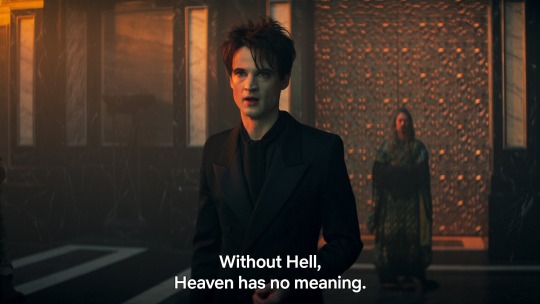
Season of Mists ends not with Dream transformed but with Hell transformed, awaiting whatever comes next. It’s a perfect metaphor for hope itself (not just for suffering): not the promise that everything will be fixed, but the possibility that everything might be different. In a time of rapid consumption and quick solutions, it reminds us that it’s sometimes the process we need before we even think about the result.
The Long Game of Redemption
Season of Mists (and the whole of the Sandman in extension) is, at least to me, so profound because it understands that hope isn’t about happy endings. It’s about the possibility of change, even when that change is partial, imperfect, and incomplete. Dream saving Nada doesn’t undo the harm he caused, but it creates space for something new. The emptying of Hell doesn’t solve the problem of suffering, but it opens up possibilities that didn’t exist before.
For new fans, especially those discovering The Sandman through Netflix, Season of Mists offers a lot of food for thought about accountability, forgiveness, and change in ways that resist both cynicism and rose-tinted glasses. It suggests that hope might not look like redemption at all. It’s rather the simple act of creating space for something different.
And I can’t help but think that in a world that often feels trapped between cancel culture and toxic positivity, Season of Mists reminds us of the long, difficult work of staying open to change while accepting that transformation is never complete, never perfect, and never final. And maybe that’s the most hopeful message of all…
#the sandman#sandman#the sandman netflix#the sandman comics#dream of the endless#the sandman analysis#the sandman meta#sandman meta#season of mists#morpheus#nada sandman#lucifer morningstar#sandman spoilers#sandman season 2 spoilers#queue crew
38 notes
·
View notes
Text
The Hidden Meaning Behind the Shelby Family Photos.
One of the things I love most about Peaky Blinders is how they use small details to show the true dynamics between characters. Two photos of Tommy’s family tell us everything:
Photo of Tommy, Lizzie, Charlie & Ruby :

They are separated into two poles: Lizzie with Charlie on one side and Tommy with Ruby on the other. That physical separation reflects the emotional one: the relationship between Tommy and Lizzie is distant, marked by a lack of true intimacy and understanding.
It is as if each one were fulfilling their role as parents separately, not as a united couple. Additionally, the fact that Tommy is with Ruby (who ends up representing both hope and curse to him) shows that his strongest connection in that family is not with Lizzie, but with their children, especially Ruby in that final stage.
The composition conveys a broken family, where closeness between parents does not exist and ties are fragmented. Tommy and Lizzie aren’t truly united as a couple. It’s a subtle but powerful way of showing how fractured they are.
Their relationship feels more like a sense of responsibility or duty than love — they stay together for the children, but their hearts are worlds apart.
This composition represents the family that Tommy builds after Grace's death, a “complete” family from the outside, but marked by tragedy and the lack of real emotional connection with Lizzie.
Although Tommy and Lizzie care about each other, their relationship lacks the fire and passion that Tommy felt for Grace. There is more resignation than romance.
Charlie is still an important part, but Ruby's arrival complicates Tommy's emotions: she represents his new opportunity to be a good father, but she also confronts him with his own darkness, especially after Ruby's illness and death.
On a symbolic level, this photo represents Tommy's struggle to find peace in a present that never feels like the home he lost with Grace.
Photo of Tommy, Grace & Charlie :

This photo represents Tommy's idealized family, the future he wanted that was cut short by Grace's death.
Grace symbolizes for Tommy the only true love, and the possibility of redemption and genuine happiness.
Charlie appears among them, his posture also suggests a strong family nucleus; He is a child protected by two parents who seem to be a team. He, is the legacy of that love and, for Tommy, a constant reminder of what he lost.
Charlie's upward gaze suggests admiration or seeking guidance from his parents, underscoring the sense of truncated opportunity; will never grow with both.
Tommy and Grace are close to each other, slightly leaning towards each other: this symbolizes togetherness, intimacy and complicity.
Mutual leaning is key: In visual language, when two figures lean toward each other, it expresses attraction, trust, and emotional connection.
Tommy and Grace were a team — they loved each other deeply.Their relationship was based on true love and connection, not just obligation.
The composition generates the sensation of a cohesive family, as if they shared the same emotional center: a unity.
Dynamically, this image reflects a deep and nostalgic emotional bond, loaded with pain, idealization and longing.
The contrast between these two images isn’t accidental. It highlights how Tommy’s heart was always with Grace, and how with Lizzie, despite having a family, he was emotionally distant and broken.
Lizzie becomes more of a companion by circumstance than a true romantic partner; Tommy fails to open his heart to her as he did to Grace, which creates resentment in Lizzie and emotional distance.
Ruby represents renewed hope that ends in tragedy: her death deepens Tommy's emotional abyss, reaffirming his belief that his destiny is cursed.
Unlike the almost sacred aura of the image with Grace, the photos with Lizzie and Ruby show a fragile family, broken by Tommy's pain and mistakes, struggling to stay together but without the same deep bond.
The images with Grace and Charlie represent the purity of love, the illusion of redemption and a Tommy who could have been different.
In Tommy's heart, his first family, Grace and Charlie, is still the real one, while his second family is a failed attempt to fill the void.
These details make the show so rich, giving us visual clues to the characters’ inner lives.
#tommy shelby#tommy x grace#grace shelby#peaky blinders#grace burgess#cillian murphy#annabelle wallis#thomas shelby#tommy x grace forever#lizzie stark#tommy x lizzie
30 notes
·
View notes
Text
[updated]
As somebody in multiple fandoms, I wanna talk about CRK, specifically eternal sugar cookie and the child or toy imagery we see when playing the game.
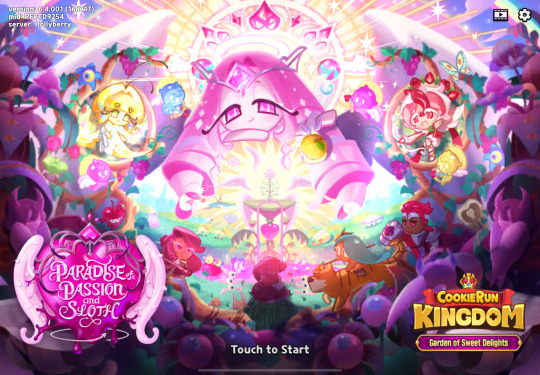
When we enter her domain, we see a lot of references to children’s toys. The roomy poly, the merry go round, the slides. Everything is in pastel and everything seems childlike.
It could be a reference to how to the idea of eternal happiness is childish, that it is not actually possible and is only the figment of imagination in a child’s world. Especially since childhood is temporary. That eternal happiness is nowhere near possible, but Eternal Sugar Cookie is surrounding herself with that delusion. It’s also the way her domain so overly bright, as if only focusing on happiness and the brightness of everything. Happiness is bright and everything, but the way Sternal Sugar’s domain is so overly bright is almost overwhelming and sickening. Her eternal happiness and her delusions can become suffocating and overbearing (not just cause of the overly bright colours but also cause some people find children overbearing and the childish dreams they have unrealistic and annoying)
I also like to note the fact she flies. While I am likely over looking it, it could be a reference to how down to earth she is. She doesn’t acknowledge hardship and only focuses on eternal happiness and joy, she is deluding herself and not even touching the ground that other cookies retread in, meaning she does not truly understand what they need or want. She gives them what she believes would grant them eternal happiness in her paradise, but it either doesn’t truly satisfy the,, or it comes at a great cost, typically the latter it seems (Sugarfly getting pretty wings but losing her ability to fly as long as she stays in paradise, Hollyberry losing her soul jam and her shield…). She does not truly understand what they need because she is not even at the same level at them. She oversees everything and sees what they need or want, but she doesn’t understand the true need or what the need or wants stem from, she only cares about giving the final result rather than focusing on the process in general.
The childlike imagery could also represent her deluding herself. We know most children are clingy and stubborn, clinging to onto what they love because it is all they know. The childlike imagery represents the way she clings so desperately onto her happiness because it is all she knows. It stems from innocence and genuine kindness, but the innocence looks grim and ominous, disgusting even when it is covered with sweets and sugar.
I also like the way she is specifically called eternal sugar. In a way, her own name is a reference the unbecoming. Sugar, while sweet, when overdone, becomes disgusting. It burns your throat and leaves your mouth dry and sticky and uncomfortable. Her drive to provide happiness and the way she is so fascinated and involved is what sets all the red flags. The excessive care she applies to ensure the happiness she believes is true is what makes Hollyberry and the others see that something is wrong. Her obsession and need to preserve what she believes is happiness drives her to manipulate, and causes Hollyberry to leave.
Additionally, I think her design having angel and devil imagery is amazing too. You cannot enjoy the taste of heaven without the taste of hell. In her case, she provides both of that. With her white knight manipulation, specifically with that one cookie who she caused to get attacked before “rescuing “ them, she provides the taste of “hell” to draw them into “heaven”, or her paradise. She is both the angel and the devil, leading people to danger and using that danger to “guide”/lure them into her paradise like an angel. She is a devil for leading them to danger and an angel for bringing them to safety, paradise. The angel motifs are more recognisable, because most cookies only see the good deeds and the protection she provides, rather than the damage she causes to provide this protection. Also I don’t think she has shoes. That could be a reference to the fact she flies so she doesn’t need them, and also cause shoes serve as protection. If there is nothing dangerous in the garden, then you would not even need shoes to prevent you from stepping on anything right? It is paradise in itself. The slight apple imagery too, the way in the opening scene she is holding the apple. Apples can technically represent knowledge, cause the fruit of knowledge from the bible is mostly portrayed as an apple. The way she is holding it suggests the way she is purposely concealing aspects of the truth away from others. Specifically,a snake is holding onto the fruit and it is wrapped around her arm. A snake tempted Eve to eat the fruit, and in eternal sugar, the snake is wrapped around her. She is what tempts people to eat the fruit and taste bitterness to encourage the, to stay in her paradise. She provides the temptation and the knowledge, and she uses it to keep people with her.
And even her domain in itself is full of little aspects here and there.
The streams are grape Soda rather than water. While other beasts have the water in their domain being different, here specifically sticks out to me.. grape Soda is sweet, grape is a fan favourite flavour but it is typically the most artificial, the chemical taste is noticeable but it is enjoyable. It could be reference to how her domain may provide happiness, but deep down, are you truly happy? There is suffering from the excessive consumption and indulgence, the rotting teeth…the teeth imagery in general, where you cannot speak up about what makes you feel bad because you are enamoured by this happiness an the overload of sugar.the way her castle itself has a beating heart, her very heart and soul lies in maintaining this paradise and providing happiness, her heart beats just to provide paradise and happiness.
Oh and also the fish. They are being carried. But fish are born to swim,and being carried removes one of their main “purposes”. They evolved to survive and swim in water, yet they are being carried. Could potentially say that the grape streams are bad for them, or that this happiness Eternal Sugar provides literally removes the passion and purpose someone used to have (cause the entire sloth thing…)
Someone in the comments pointed out the body horror, and I realised I failed to mention that. So first of all, shoutout to that person who talked about it, thank you so much for saying it, i completely forgot. Second of all, the body horror involving the little tooth fairies or something, literally decaying but still drinking the grape soda water is saying something about Eternal Sugar’s domain too. The happiness she provides is doing more harm than good in some cases. It is sugary sweet and only focuses on the bright side without seeing the side effects of danger, and it males it dangerous. Similarly for Sugar Fly cookie, she lost her ability to fly and her wings were potentially perm and damaged after breaking free from the syrup. The happiness Eternal Sugar’s granted caused more harm than good. When you’re blinded by happiness and optimism, you fail to see the bits of danger that lurks and you risk wandering it into more. Similarly, Hollyberry losing her shield could reference to both the loss of passion and also safety and protection. So blinded by happiness and this chance to indulge, you risk decaying and rotting away at yourself too.
Eternal sugar is so beautiful in so many ways, I adore her. I might add to this if I can, but I don’t know.
#cookie run kingdom#eternal sugar cookie#theory#i’m insane#please listen to me ramble please#I have my heart and soul in this#crk#cookie run#paradise of sloth and passion#I’m so late but whatever
25 notes
·
View notes
Note
is it just me or does it seem like Percival was at least somewhat in love with Galahad in many Grail Stories?...
...maybe just a platonic obsession...
I think there are many ways to interpret the relationship between Perceval and Galahad.
It's pretty consistent lore that they're blood related, both descended from Joseph of Arimathea, which is what makes them worthy of the Grail Quest (along with Bors).
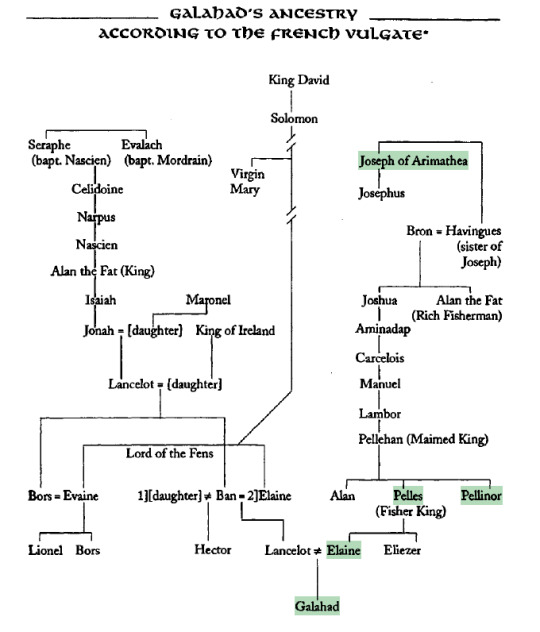
— The Arthurian Handbook 2nd Edition by Geoffrey Ashe and Norris J Lacy
In the The Story of Merlin in the Vulgate, Perceval's father, King Pellinor, the original maimed king, and Galahad's grandfather, King Pelles of Listenois, were full brothers. That makes Galahad's mother, Elaine of Corbenic, first cousins with Perceval.

In La Tavola Ritonda, Galasso's (Galahad's) father Lancilotto (Lancelot) is stated to be a kinsman of Amorotto (Lamorak) [and thus, Prezzivale (Perceval)], although no clear family tree is established. They could be kin by blood or through marriage, it's unclear.

Regarding Perceval's "obsession" with Galahad, one has to keep in mind that the French literary tradition looked down on Perceval as the Grail Hero for being Welsh; the author wrote a story which subtextually and overtly reveres Galahad purely on the basis of his French origins. Galahad openly represents a Christ figure, going so far as to crown him king in the Holy Land. So Perceval's (and the other knights') fixation and interest in following Galahad is intended to reflect the apostles of Jesus Christ. So at least in part, Perceval's preoccupation with Galahad is meant to vindicate Galahad's divinity.
In Malory’s Percivale: A Case of Competing Genealogies? by Dhira B. Mahoney, Galahad's usurpation of Perceval's role in the story is outlined in detail.
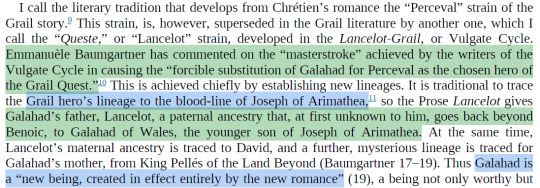

In a more general sense, drawing a line between the platonic/romantic implications of love in Medieval literature is an effort in futility. Medieval people had no words to express homosexual desire. "Friend" had many meanings for all types of relationships and people. Just as Isolde/Tristan, Guinevere/Lancelot, etc refer to each other as "friends," so do many of the knights. Differentiating intent will inevitably be subjective and situational. Each reader's interpretation is their own, so while I don't think any interpretation is definitive, I do think the context of the Vulgate's publication, both era (12th century), location (France), and religious/colonialist (Western Catholic) sentiment behind it, indicates authorial intent pretty clearly.
Whether or not Perceval and Galahad's relationship is familial, platonic, romantic, a combination, or none of them, it's a lot more complicated (and varied between texts) than one label or feeling alone can convey.
#arthuriana#arthurian legend#arthurian mythology#arthurian literature#sir galahad#sir perceval#sir percival#vulgate#ask#anonymous
22 notes
·
View notes